
项目位于山东蒙山旅游区百花峪内沿街的一处民居住宅。原有场地由两户单进传统民居院落组成,其中一户便是当地老村长的家。业主希望在原有的住宅建筑边界范围内新建一个民宿,同时为老村长保留独立的居住空间。
The project is located in a residential house along the street in Baihuayu, a tourist area in Mengshan, Shandong Province. The original site consists of two single-entry traditional residential compounds, one of which is the home of the local village head. The owner wanted to build a new guest house within the boundaries of the original residential building, while preserving a separate living space for the village head.
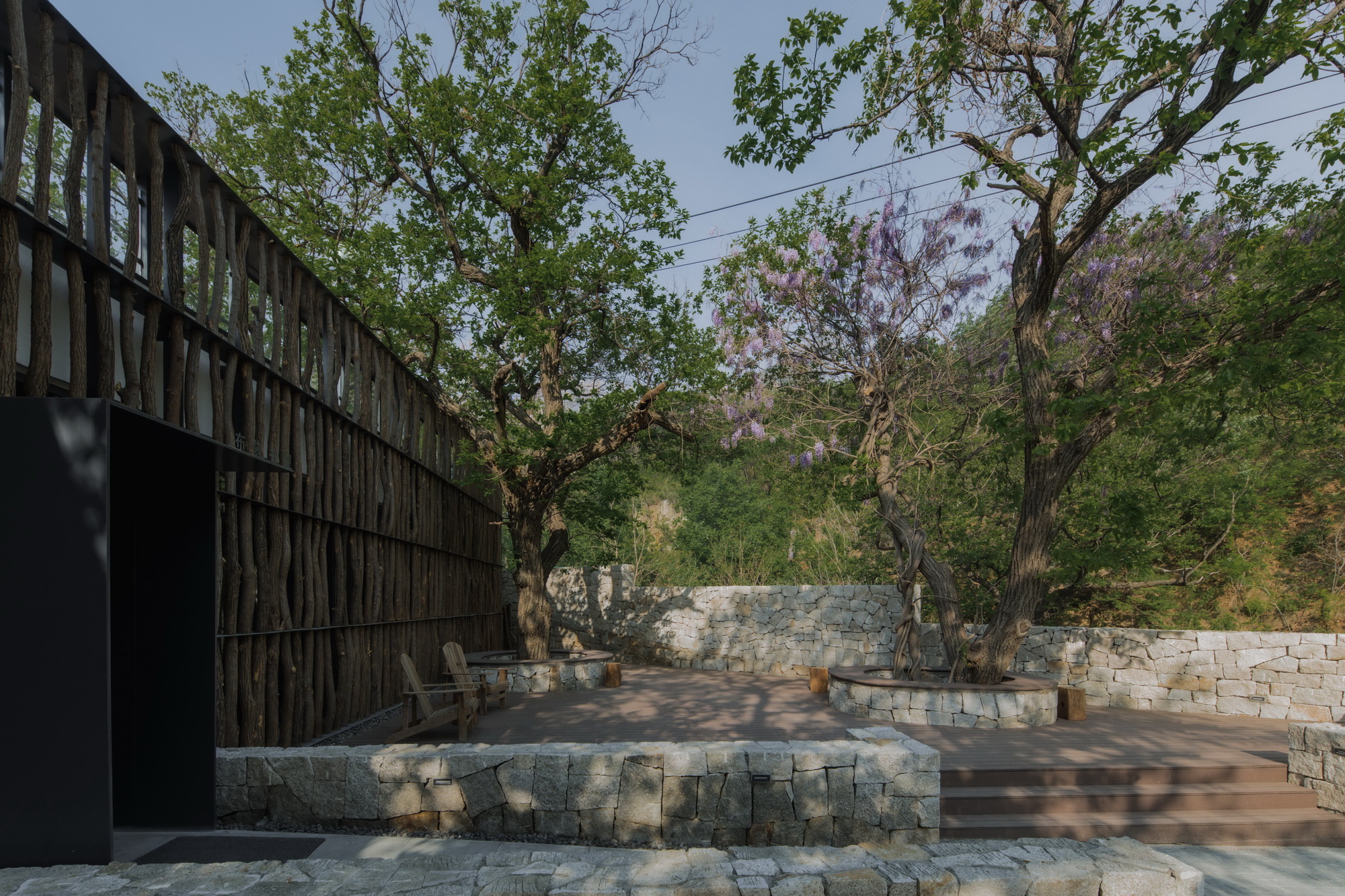
▲ 项目概览 Project Overview
原始场地内的住宅被硕大的板栗树群包裹着,成为基地内极具特色的自然景观。前院则是老村长搭建的木质树屋,简易却颇有趣味,有很多艺术学生常常会在此进行写生活动。整个设计也正是基于对现状栗树林景象的保留,自发而质朴的生活场景的再现,以及民居空间类型学形制演化三个维度的思考。
The original site are wrapped by a cluster of large chestnut trees, which has brought a very characteristic natural landscape to the base. In the front yard, there is a wooden tree house built by the village head, which is simple but interesting, many art students often meet here and conduct life-sketching activities. The whole design is therefore considered from three perspectives: preservation of the current chestnut grove, reproduction of the spontaneous and simple living scene, and evolution of the spatial typology of the residential space.
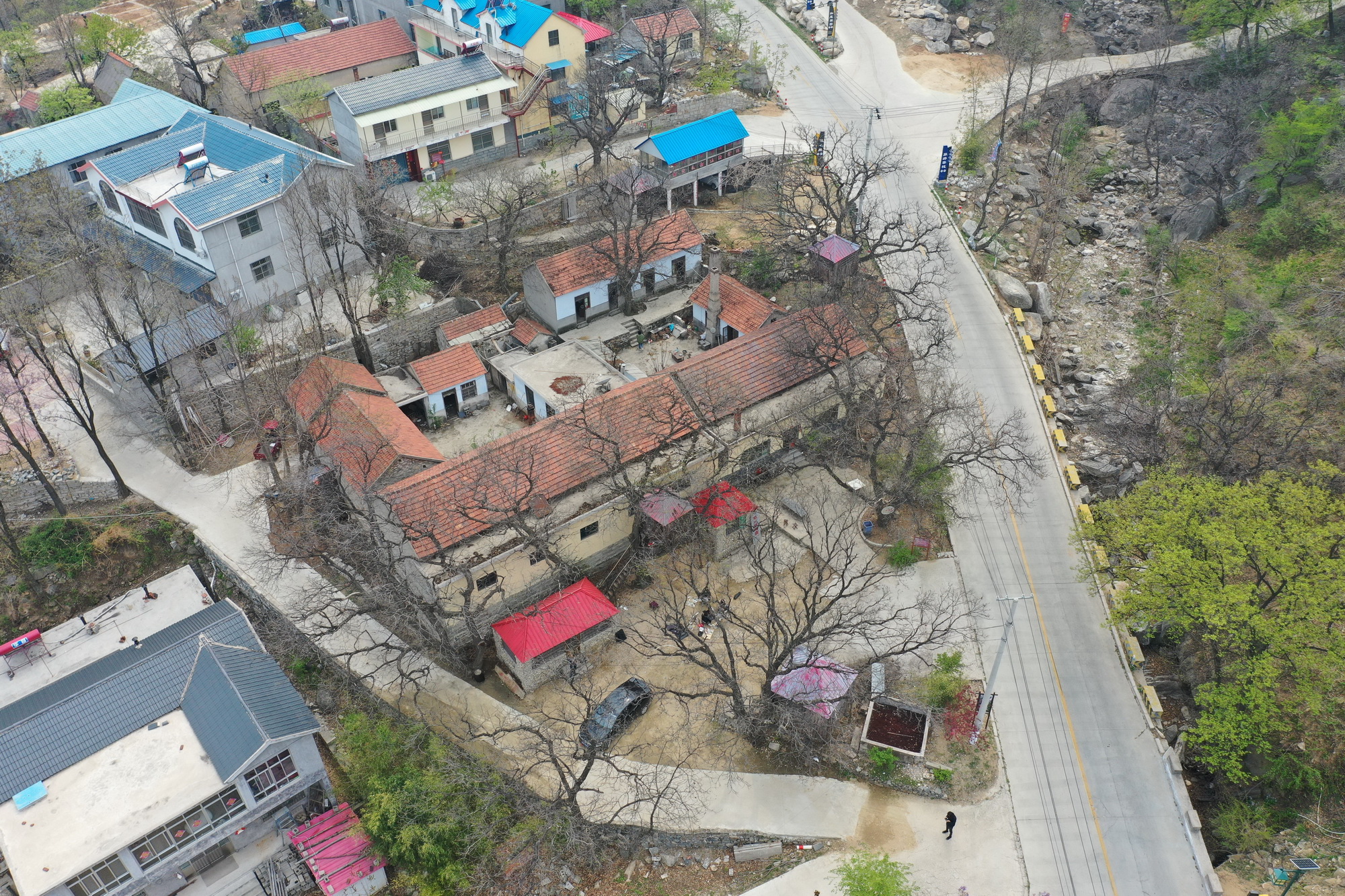

▲ 原始场地(航拍和树屋)Original site (Aerial view & Tree house)
前院、刺槐与书屋 Forecourt,Robinia pseudoacacia and Study
设计保留了前院的三角地带,作为项目的入口景观空间。同时,所有的板栗树都被完好地保存了下来。我们对老村长的树屋进行了修缮与更新,作为场地原始记忆的留存。
The design preserves the triangular area of the front yard as the entrance landscape area of the project. Meanwhile, all the chestnut trees are well-preserved. We repaired and renewed the village head's tree house as a retention of the site memory.
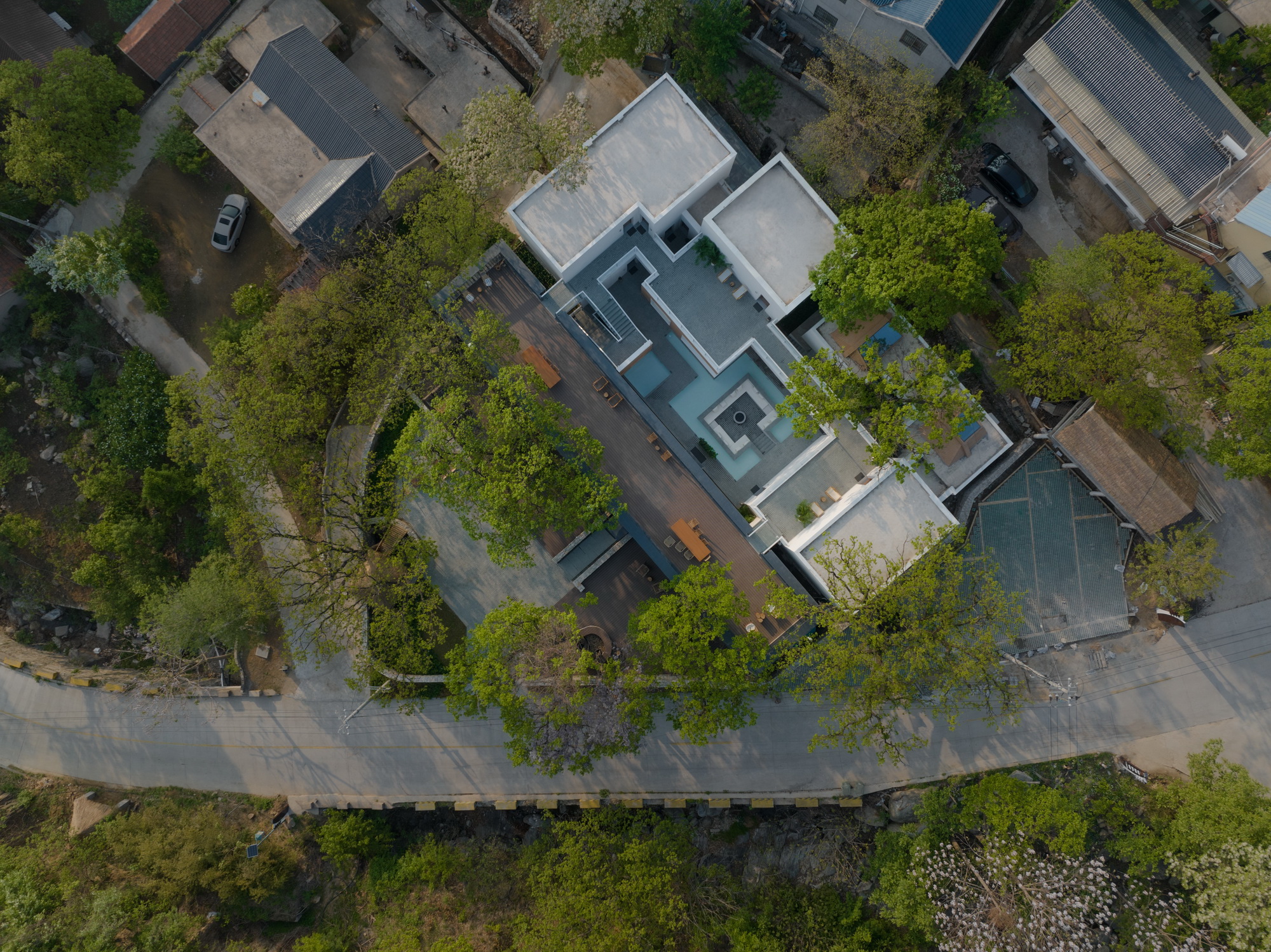
▲ 鸟瞰 Aerial view
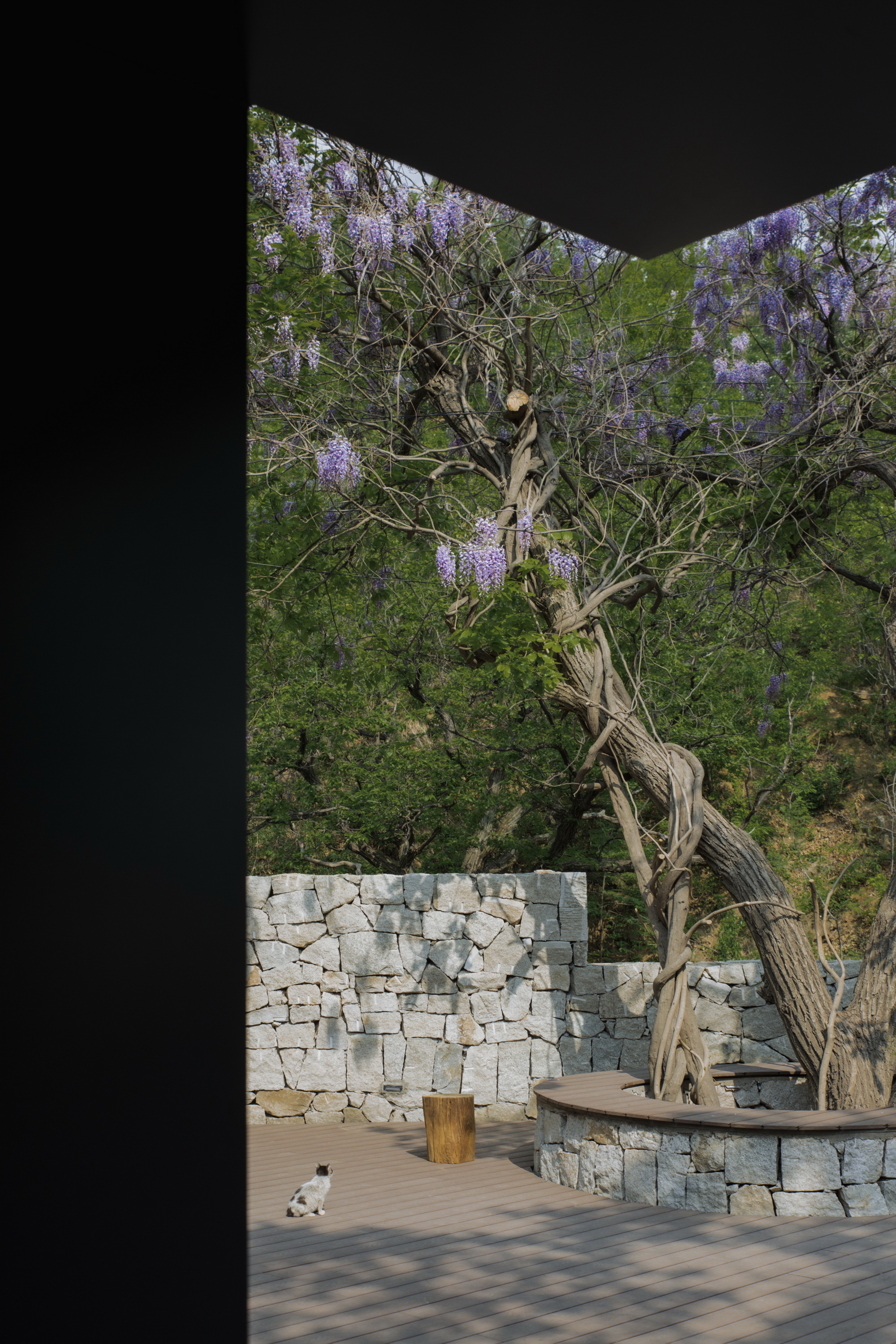
▲ 保留的板栗树与紫藤 Preserved chestnut tree and wisteria
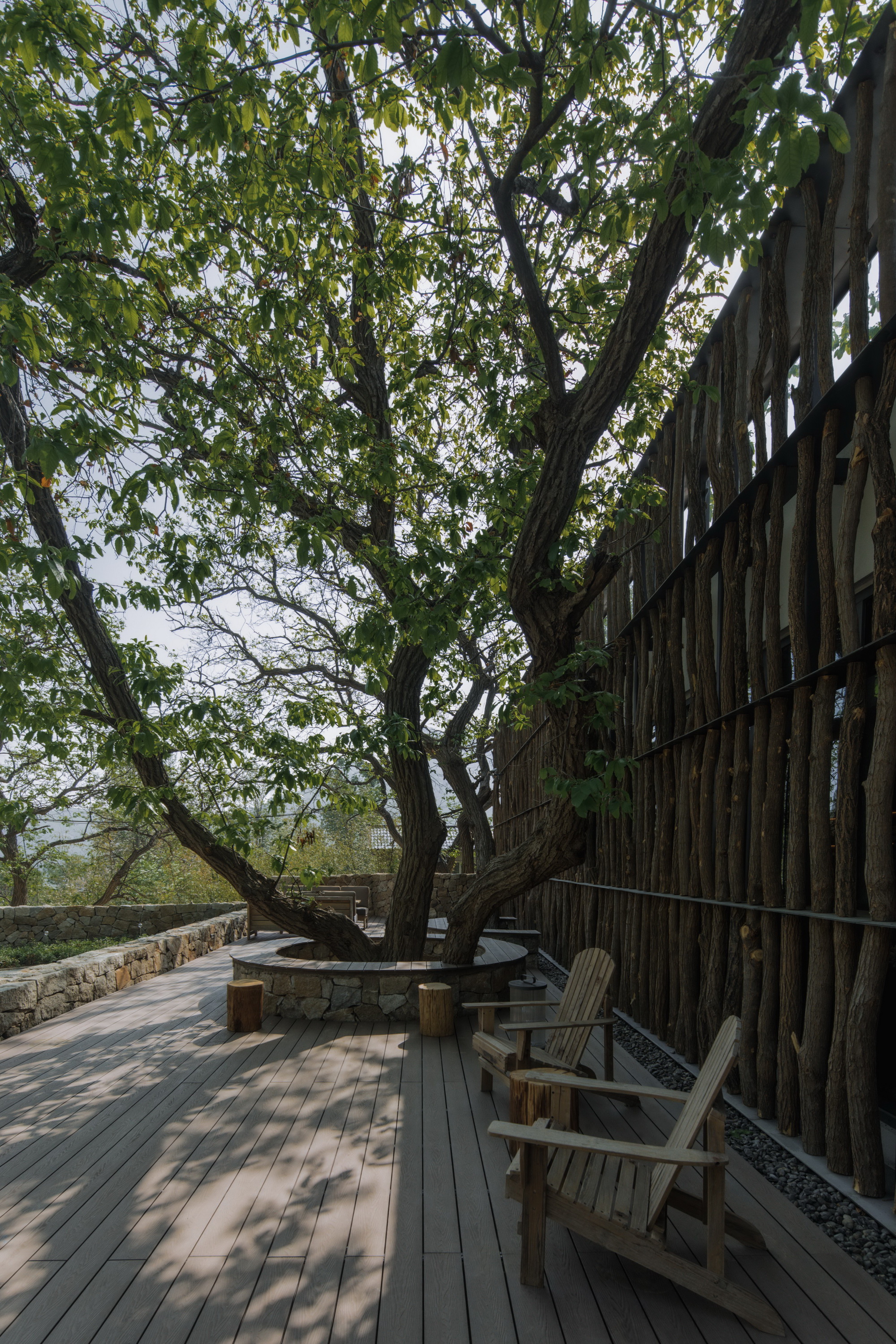
▲ 保留的板栗树与景观平台 Preserved chestnut tree with landscape platform
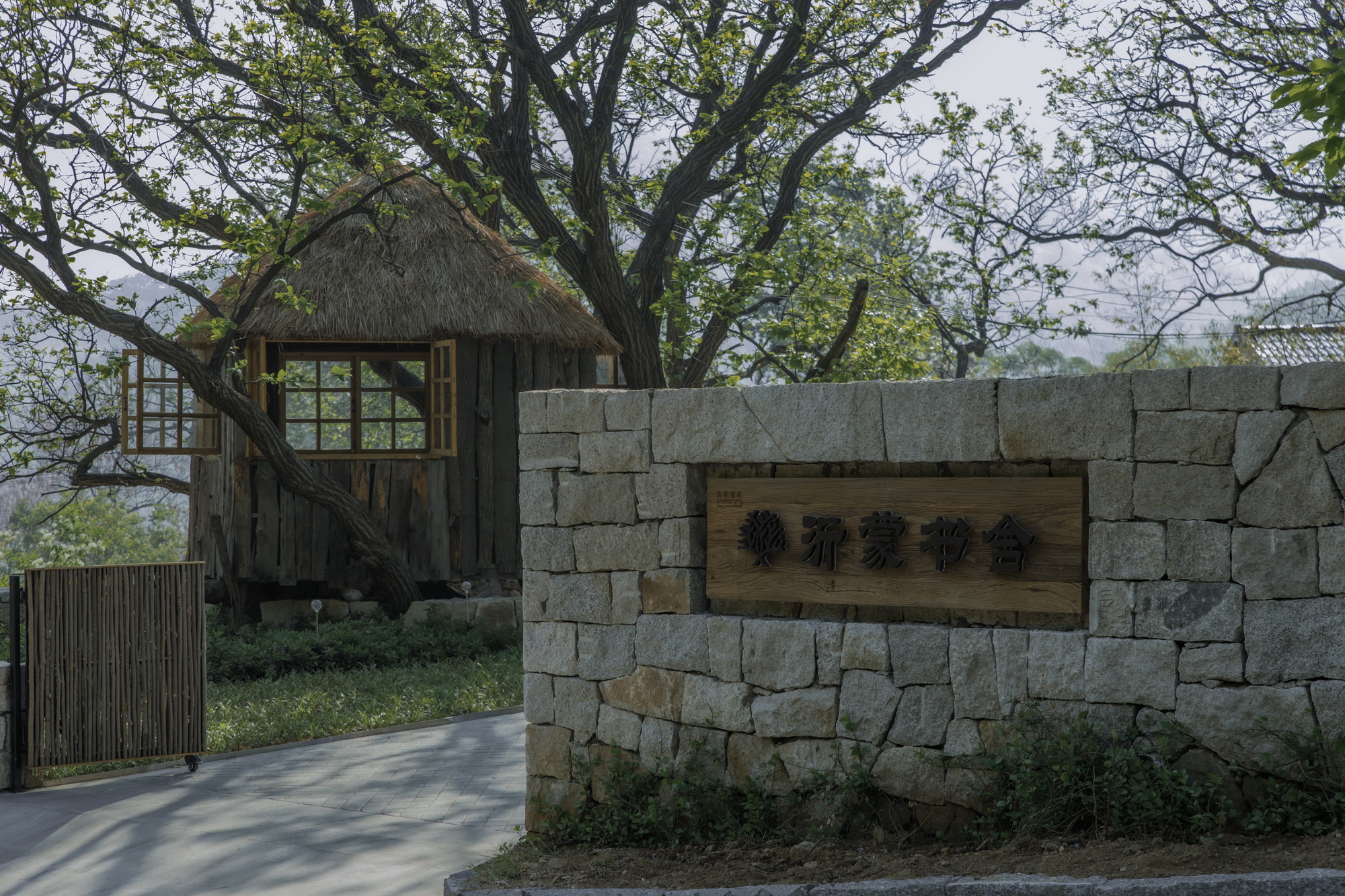
▲ 树屋的更新 Renewed tree house
我们对不规则三角形院落标高进行了整体抬升,使得入口建筑顶部的屋顶露台与树的关系更加紧密。同时,也在场地内形成了三个相互独立的台地区域,增添了景观与户外活动场景的丰富性。
The irregular triangular courtyard has been raised so that the roof terrace at the top of the entrance building is more closely related to the trees. At the same time, three separate terrace areas are created within the site, adding to the richness of the landscape and outdoor scenes.
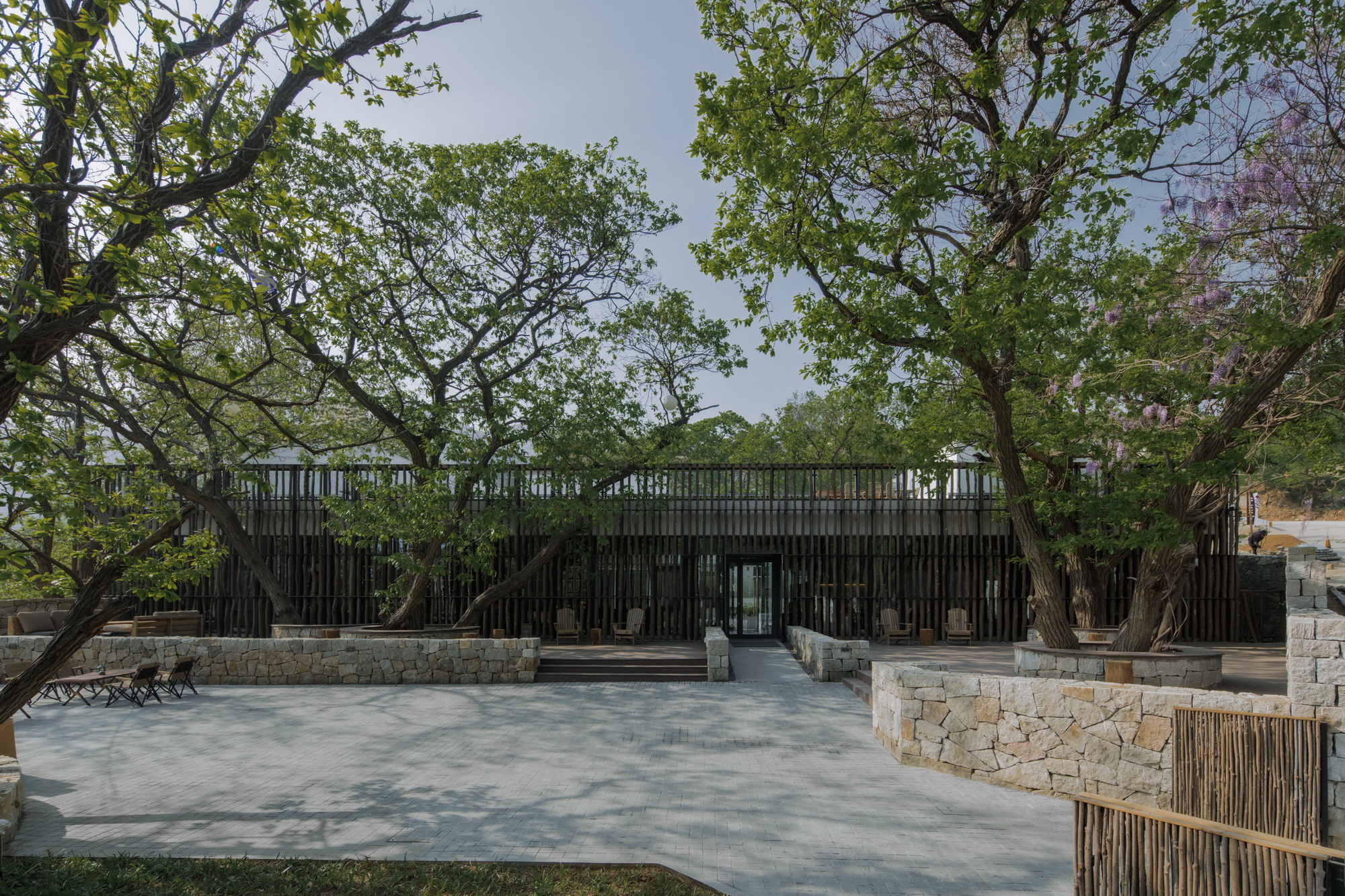
▲ 前院台地空间 Front yard terrace space
入口的长条形体量延续了原始场地的建筑边界,隔离开了前院与后部的客房空间。它承载了整个民宿的接待、休憩与早餐厅的功能,同时也作为一个独立运营的书屋。我们希望它以一个更开放的姿态存在,依然为艺术写生的学生和路过的游客提供一个驻留的场所。
The elongated volume at the entry extends the architectural boundaries of the original site, separating the front yard from the guest spaces at the back. It carries the functions of reception, lounge and breakfast area for the entire guest house, and also serves as an independently operated bookstore. We hope that it exists in a more open manner, and still provides a place for art students and passing tourists to stay.
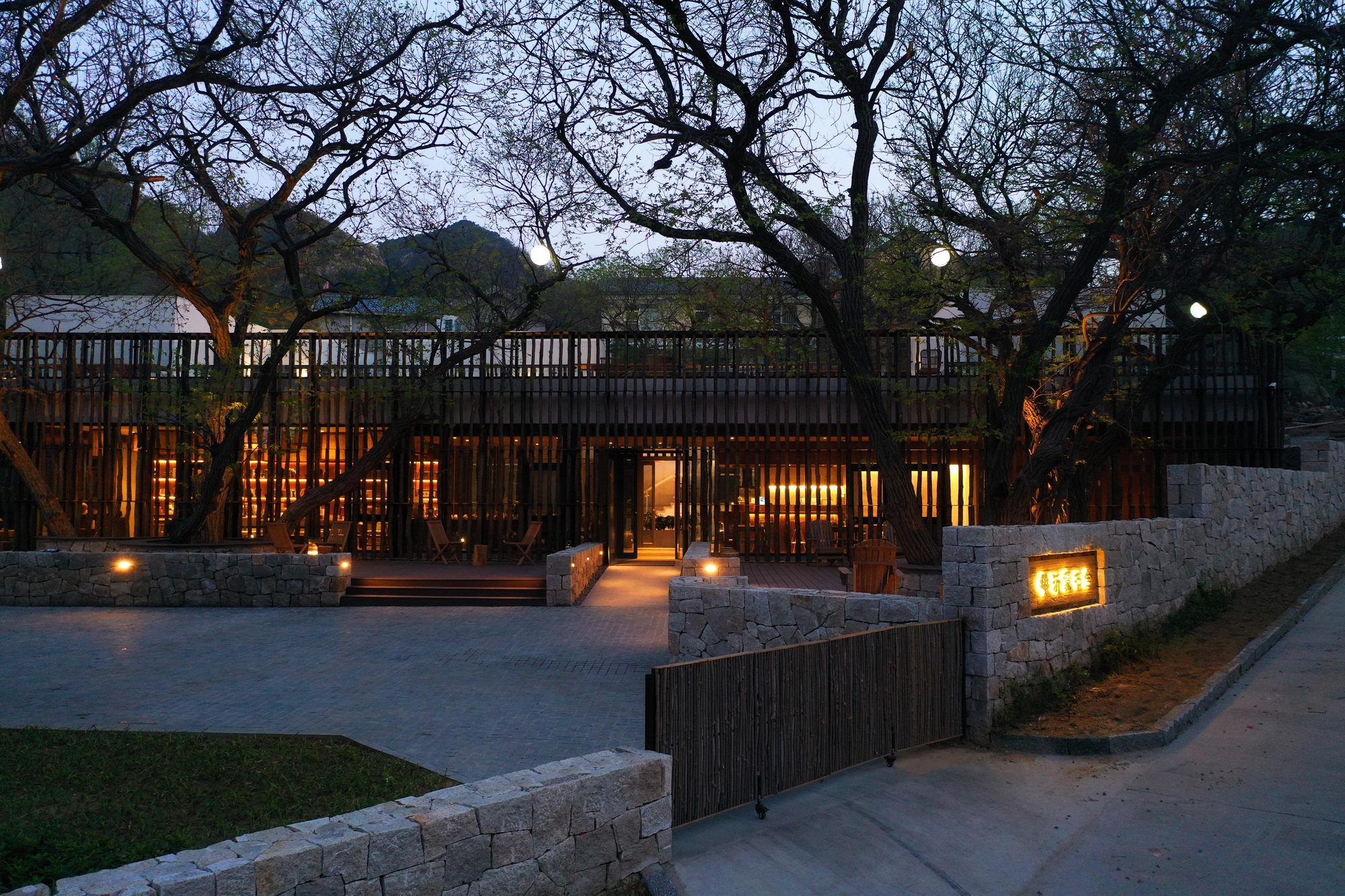
▲ 书屋夜景 Night view of the bookstore
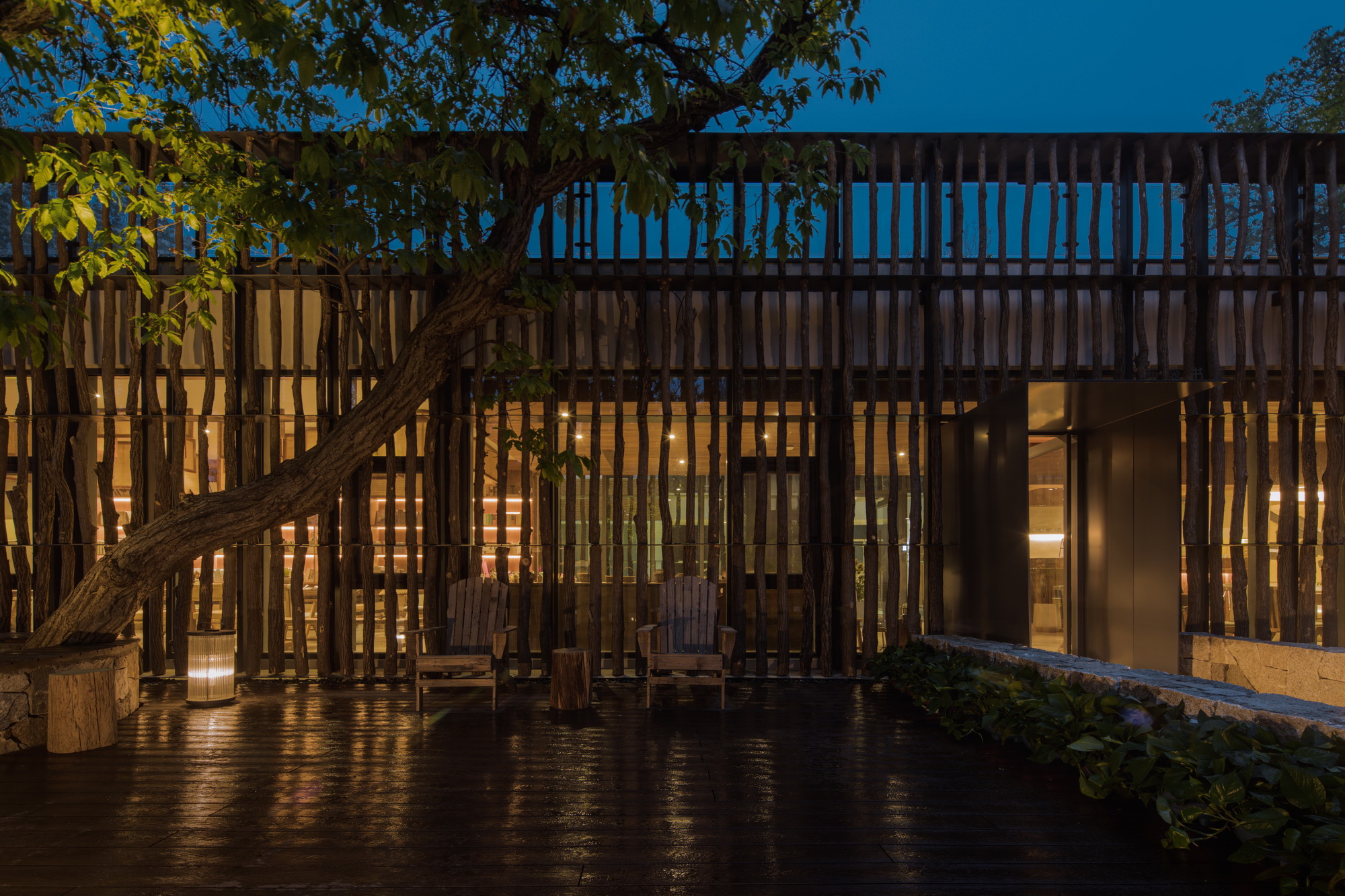
▲ 书屋夜景 Night view of the bookstore
书屋的立面采用了在地的自然废弃材料-刺槐枝干。4年前我们偶遇了当地村民在路边堆放修剪下来的刺槐树多余树杈,这可以算是在最初调研过程中的一次意外发现。设计希望书屋的立面可以随时间和光线的变化而产生变化,同时在场地中保持着低调的姿态,与周边的树木更好地融合在一起。
The facade of the bookstore is made of locally sourced natural waste material, Robinia pseudoacacia branches. The idea came from an unexpected discovery during our first research four years ago, we accidentally came across local villagers and discovered these pruned robinia pseudoacacia branches which were piling up by the roadside. The design hopes that the facade of the bookstore will change with time and light, while maintaining a low profile within the site and integrating better with the surrounding trees.
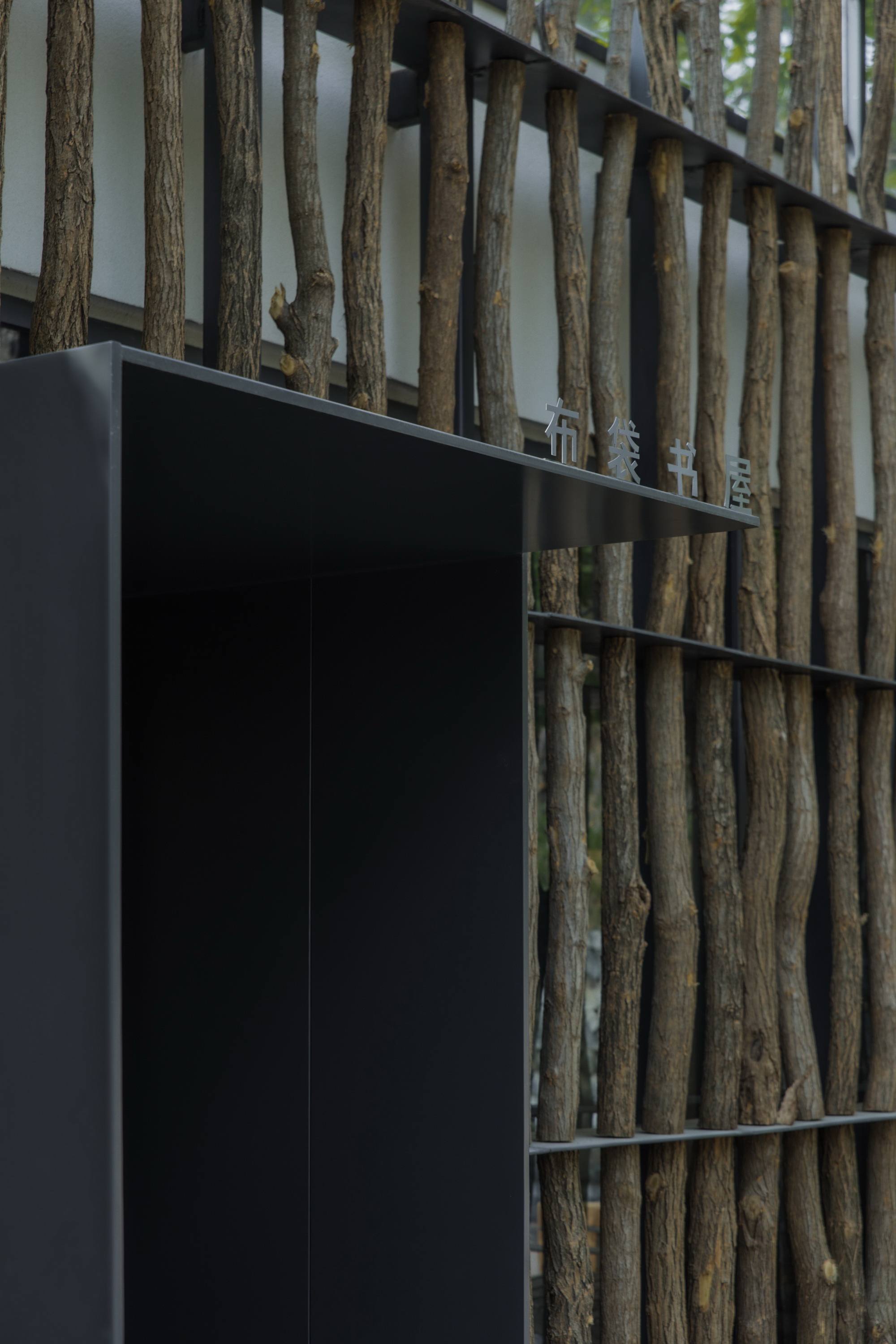
▲ 书屋立面与入口 Bookstore facade and entry
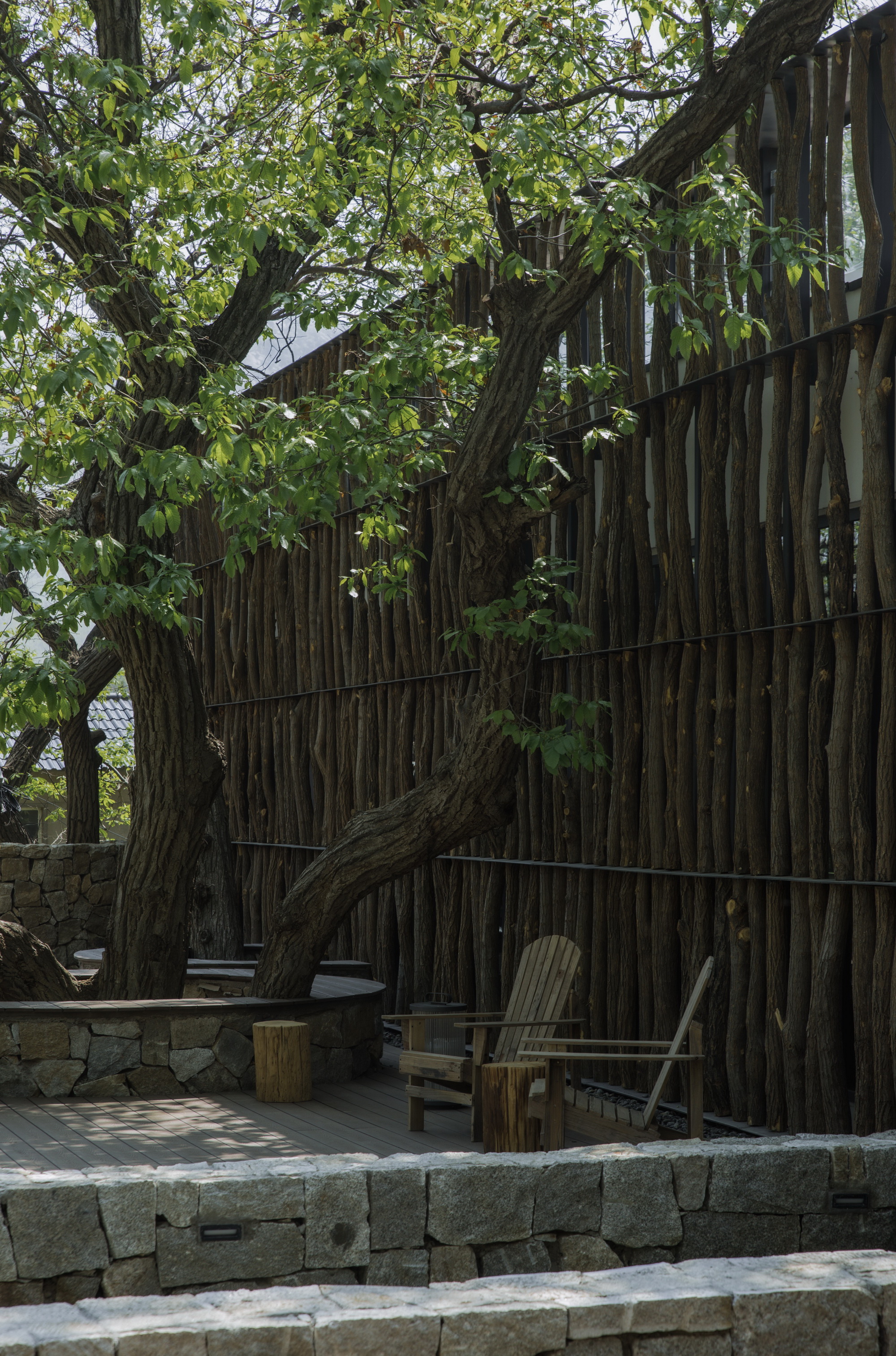
▲ 书屋立面与休憩平台 Bookstore facade and resting platform
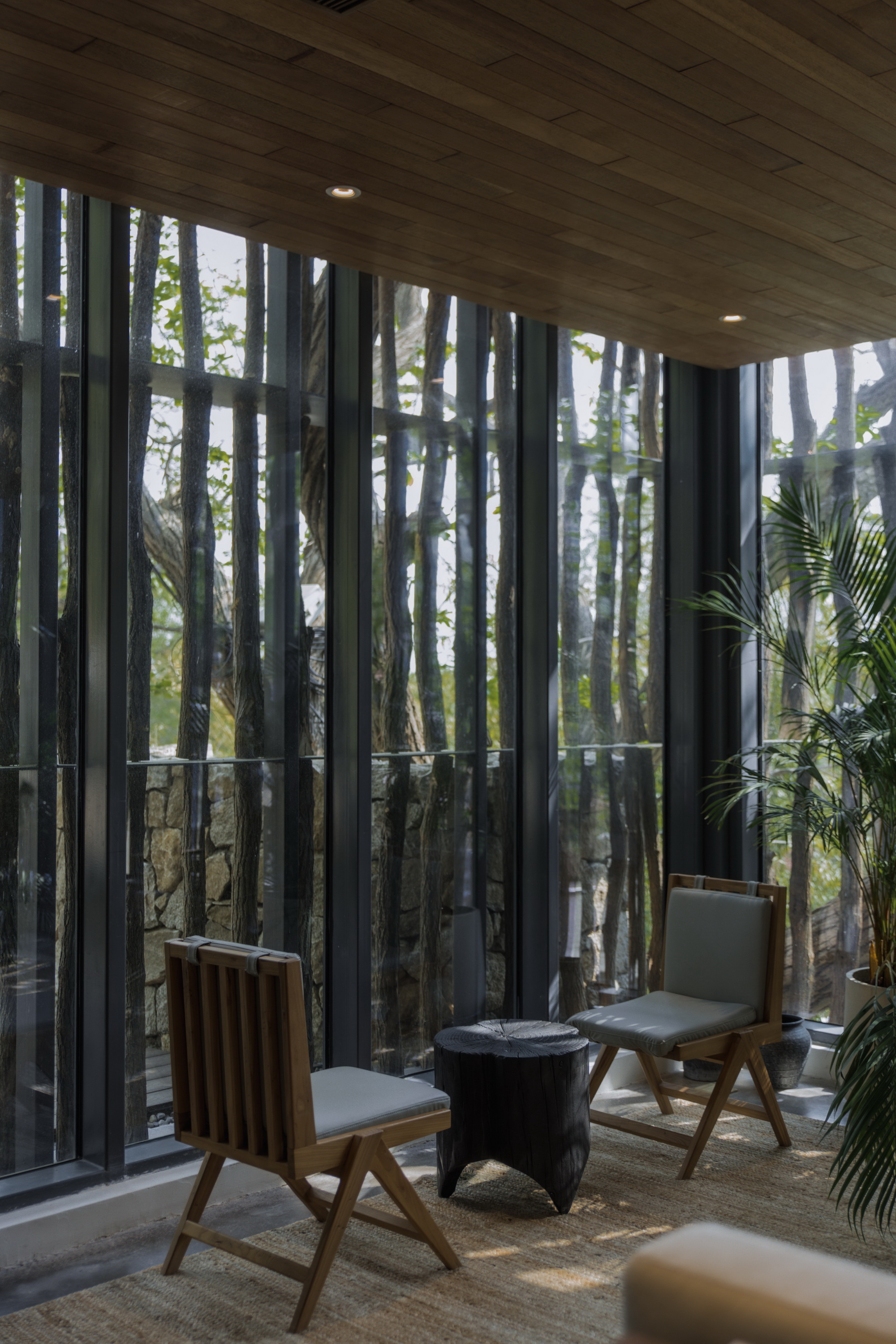
▲ 书屋内部 Interior of bookstore
树影与内院 Shadows and inner court
内部院落保留了传统民居的围合形制。后部客房空间为两层的建筑体量,底层和书屋环绕出了一个带浅水池的下沉式内院。同时,一层客房靠近水池的部分通过角窗与下沉庭院形成互动关系。
The inner courtyard retains the enclosed form of traditional residential house. The guest room space at the back is a two-story volume, with the ground floor and the bookstore encircling a sunken inner courtyard with a shallow pool. At the same time, parts of the first-floor guest rooms that near the pool are able to interacts with the sunken courtyard through corner windows.
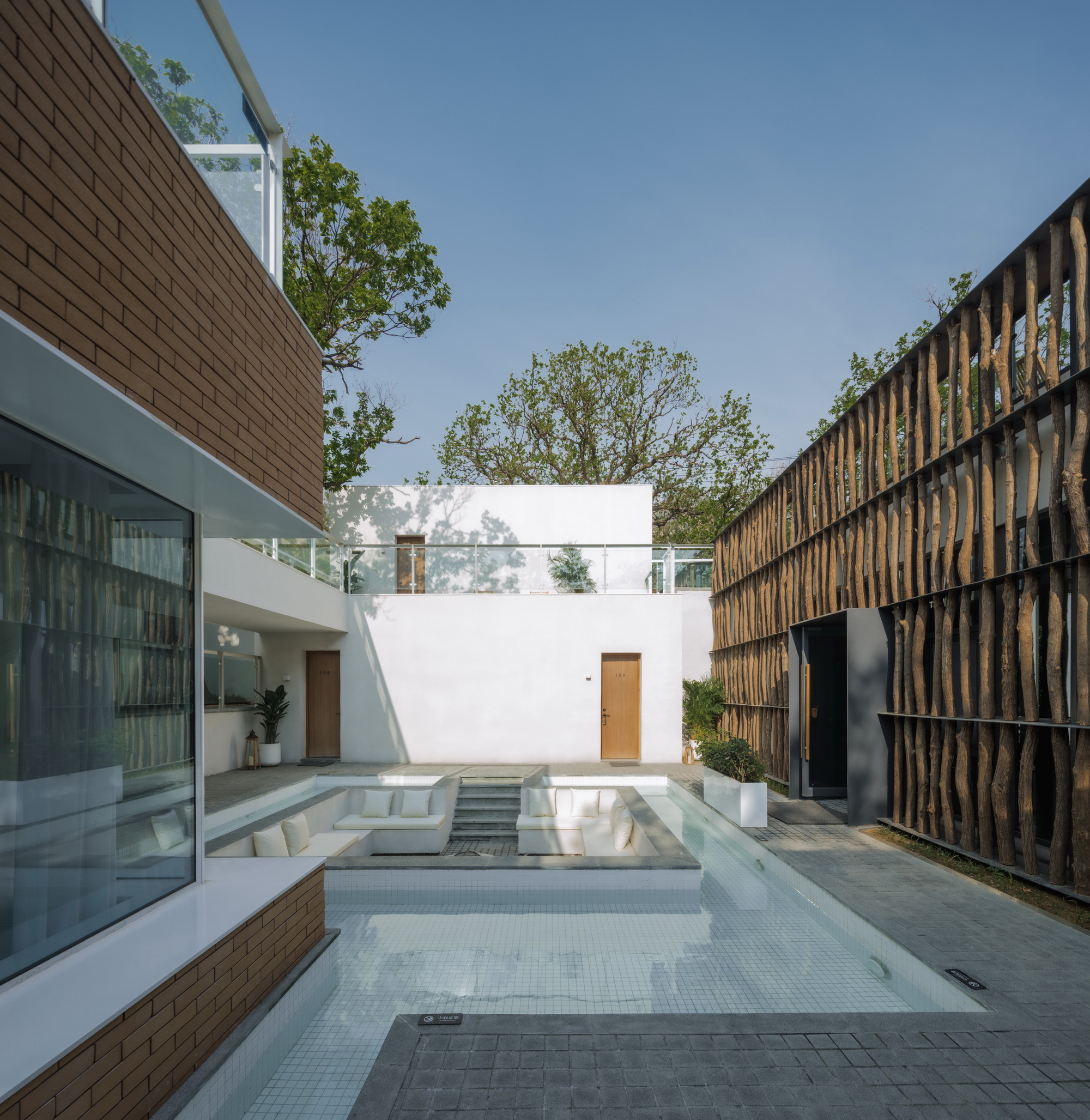
▲ 下沉庭院 Sunken courtyard
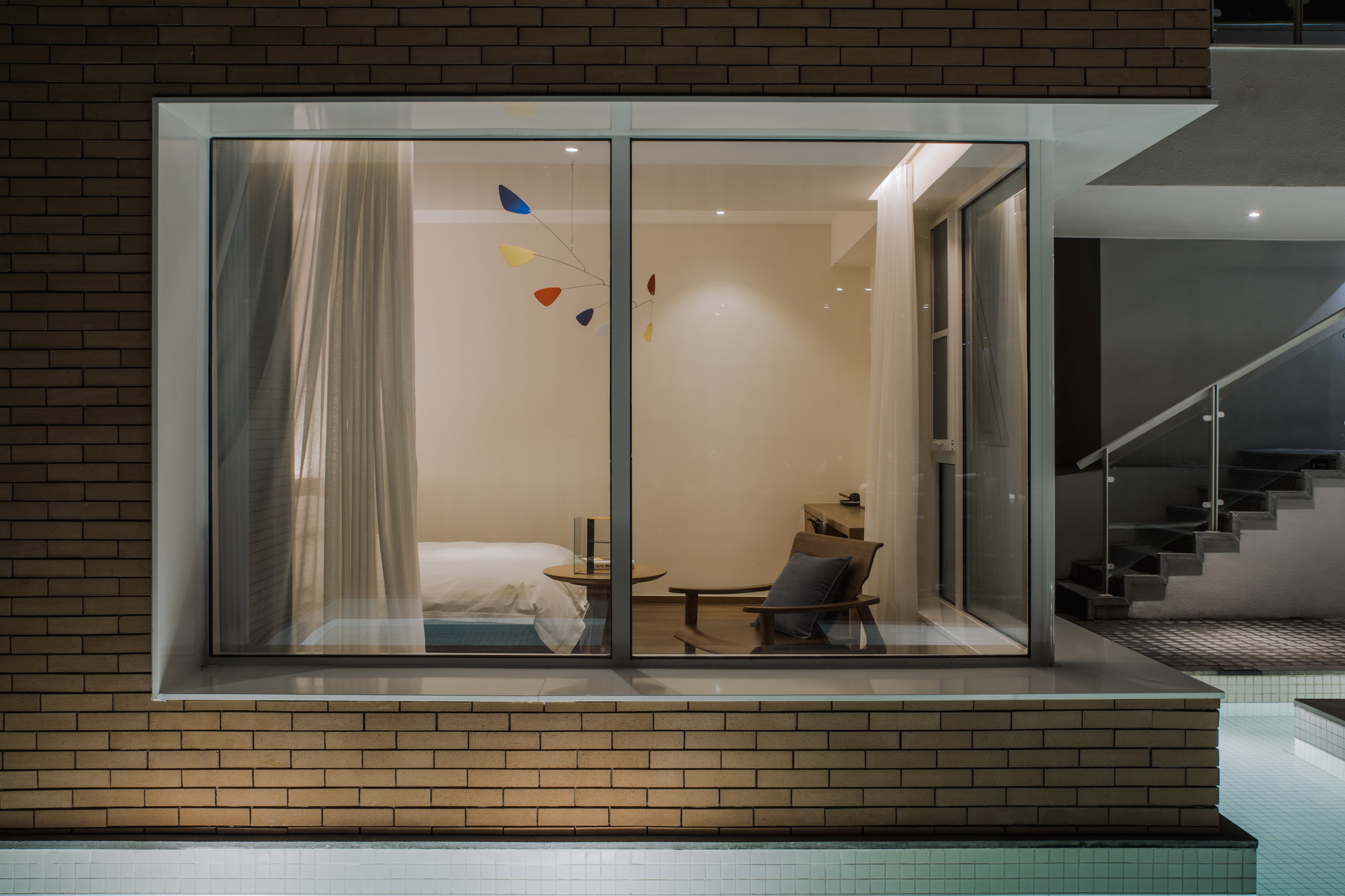
▲ 底部角窗与庭院 Corner window and courtyard
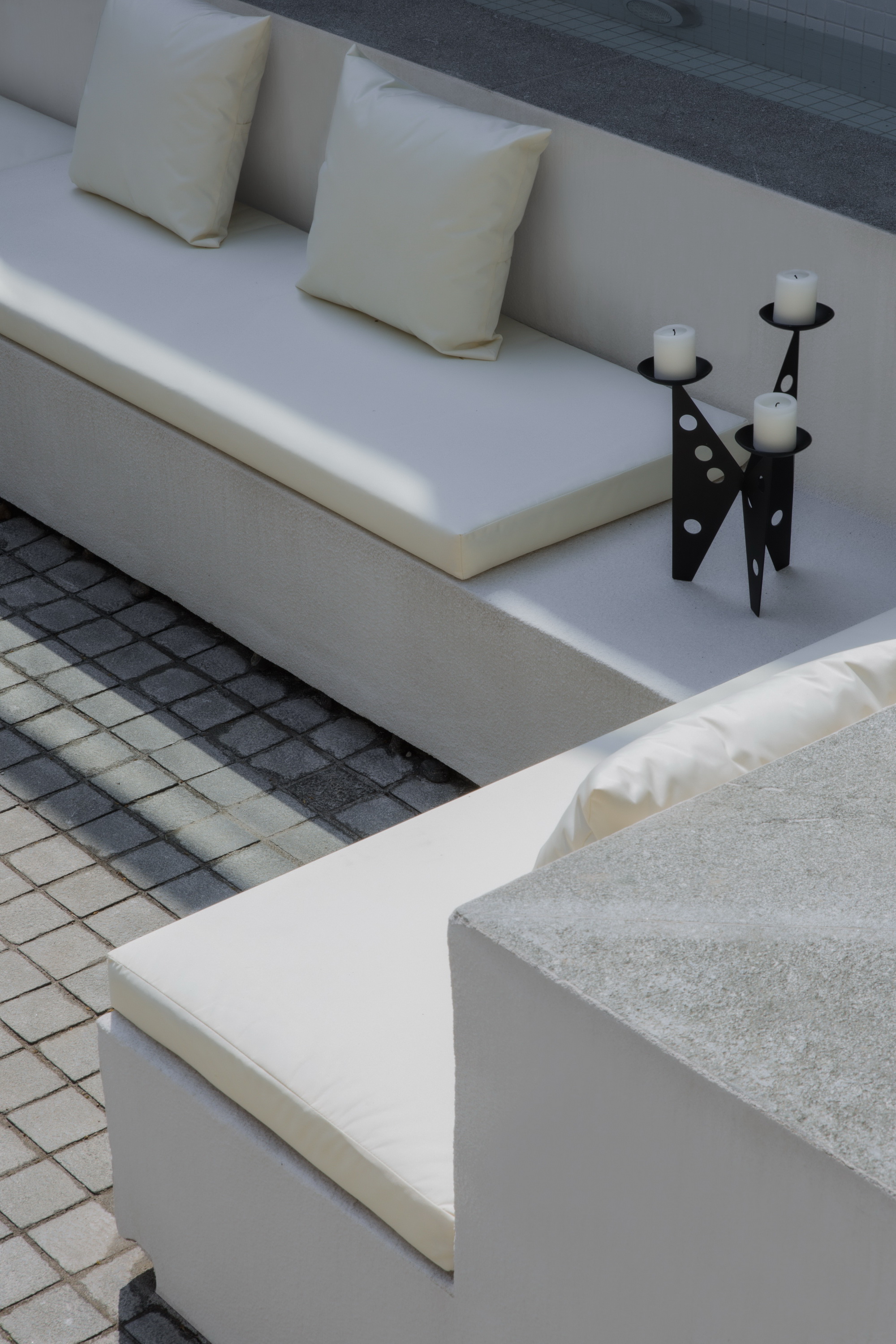
▲ 下沉庭院细部 Sunken courtyard detail
客房区域的二层外部露台与书屋的顶部形成了连续环绕的露台空间,整个屋顶界面都被外部的板栗树包裹着。
The second-floor exterior terrace in the guest area forms a continuous wrap-around terrace space with the top of the bookstore, and the entire roof interface is surrounded by exterior chestnut trees.
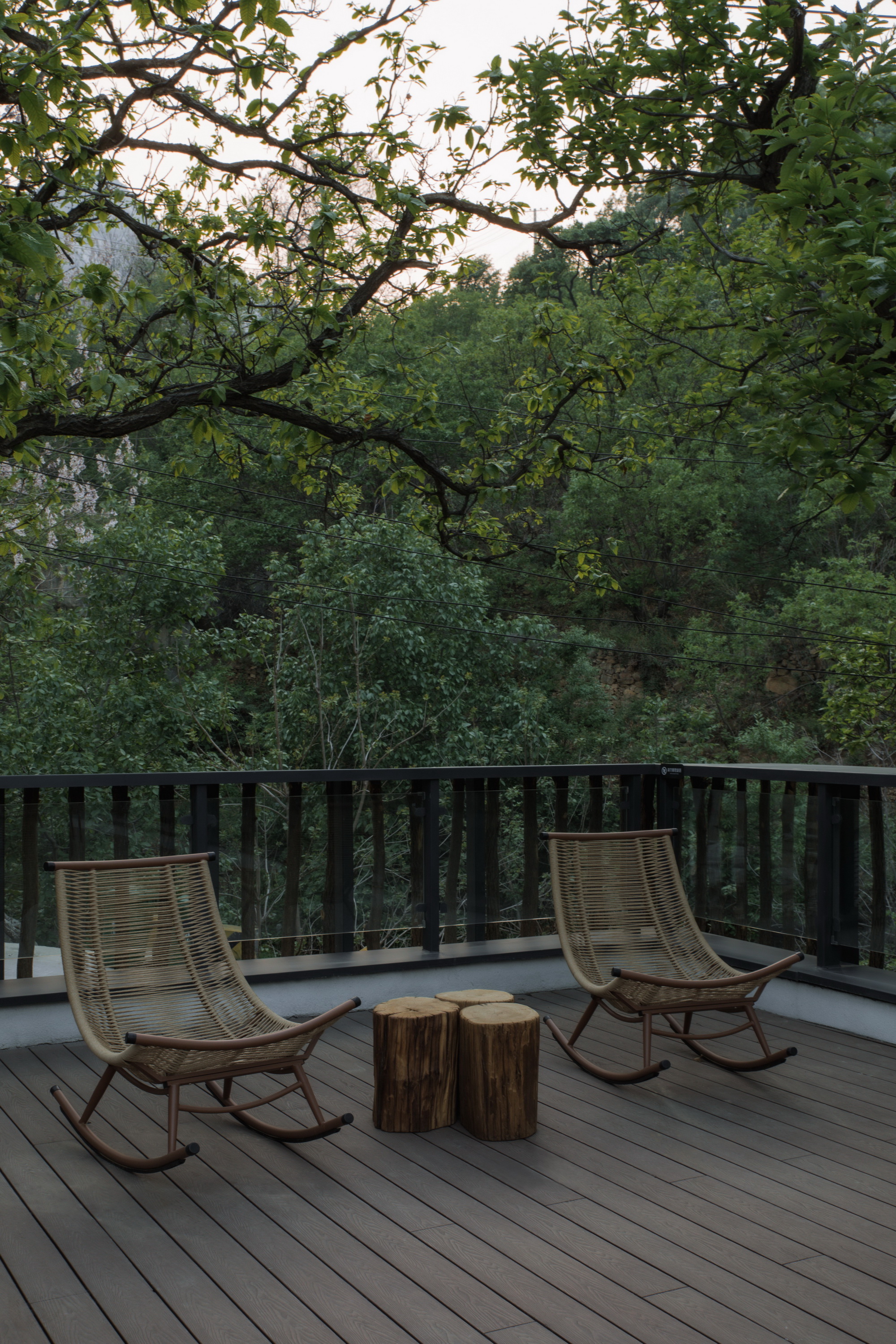
▲ 书屋屋顶露台与板栗树 Bookstore roof terrace and chestnut tree
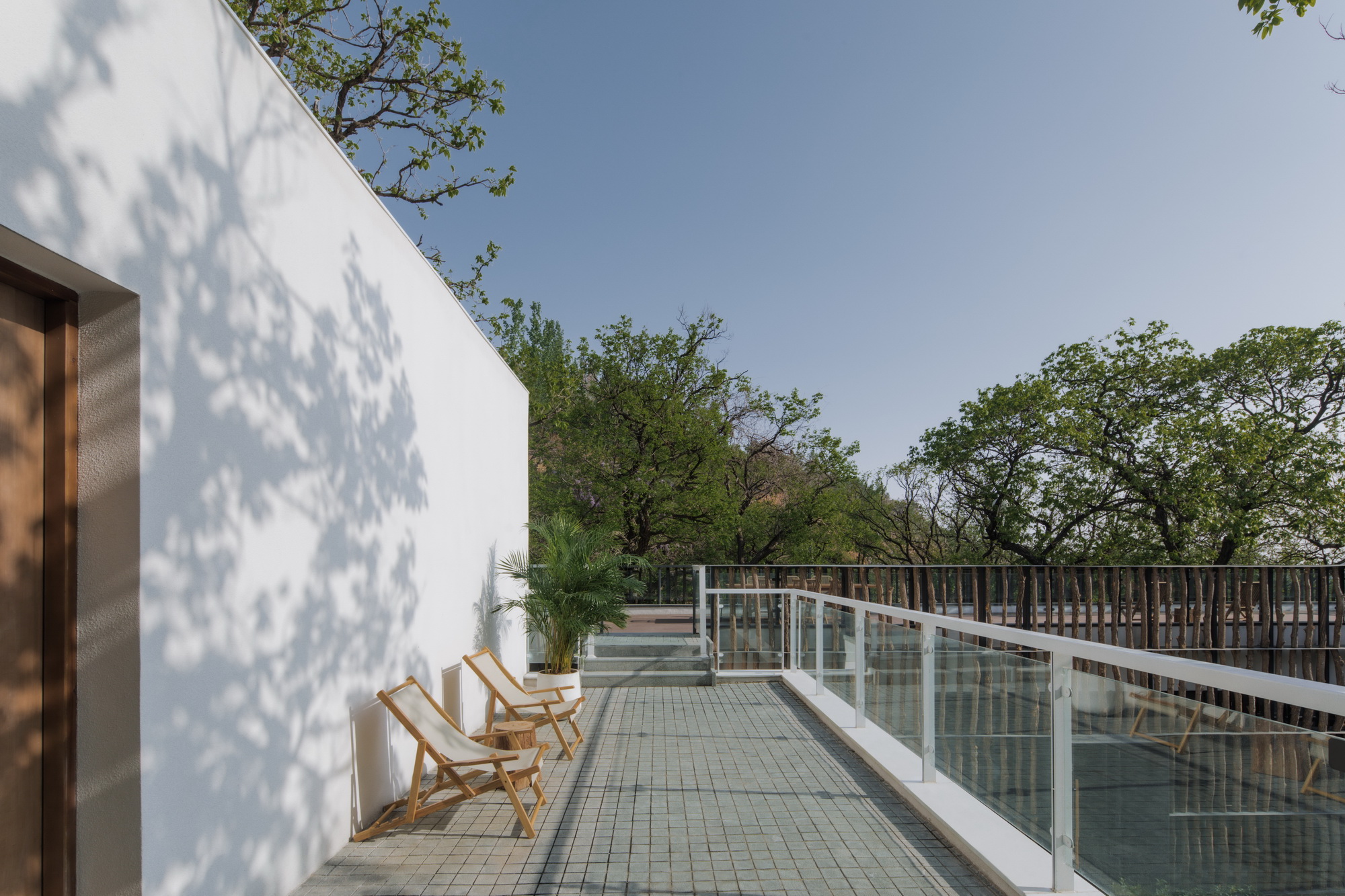
▲ 客房外露台空间 Terrace space outside guest room
院落后部保留了场地内部的原始高差和板栗树,建筑倾斜的顶部天窗和树影之间形成了有趣而不断变化的光影场景。
The original height difference and chestnut trees of the site has been retained at the back of the courtyard , which creates an interesting and ever-changing scene of light and shadow between the sloped skylight and the trees' shadows.
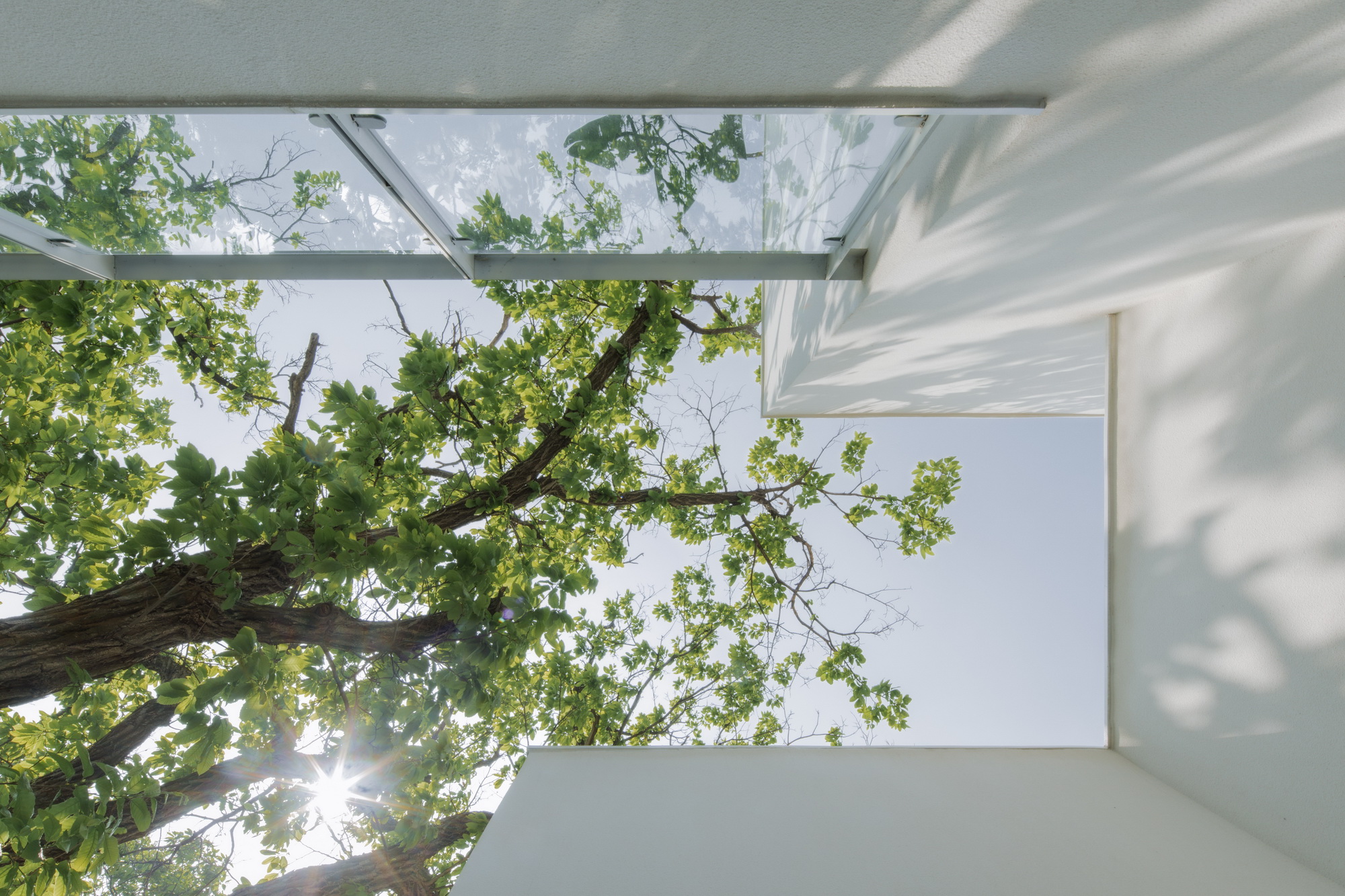
▲ 客房与板栗树 Guest room and chestnut tree
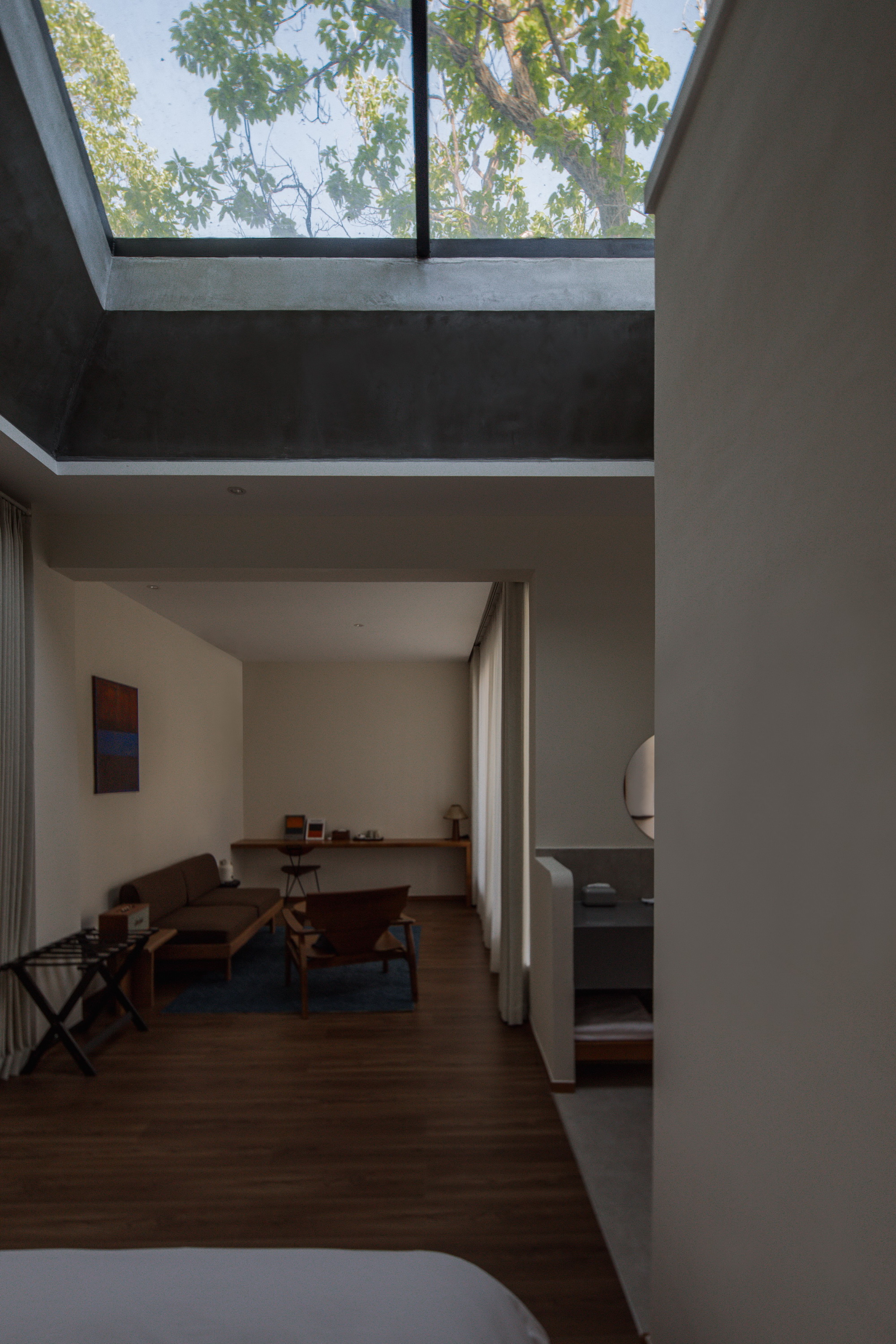
▲ 屋顶天窗 Rooftop skylight
整个建筑与周边环境的关系是相对内向的,客房通过角窗在可观察到景观的位置向自然环境打开, 与山野和庭院对话。
The relationship between the building and its surroundings is relatively inward-looking, the guest rooms open up to the natural environment through corner windows, conversing with the mountains and courtyard.
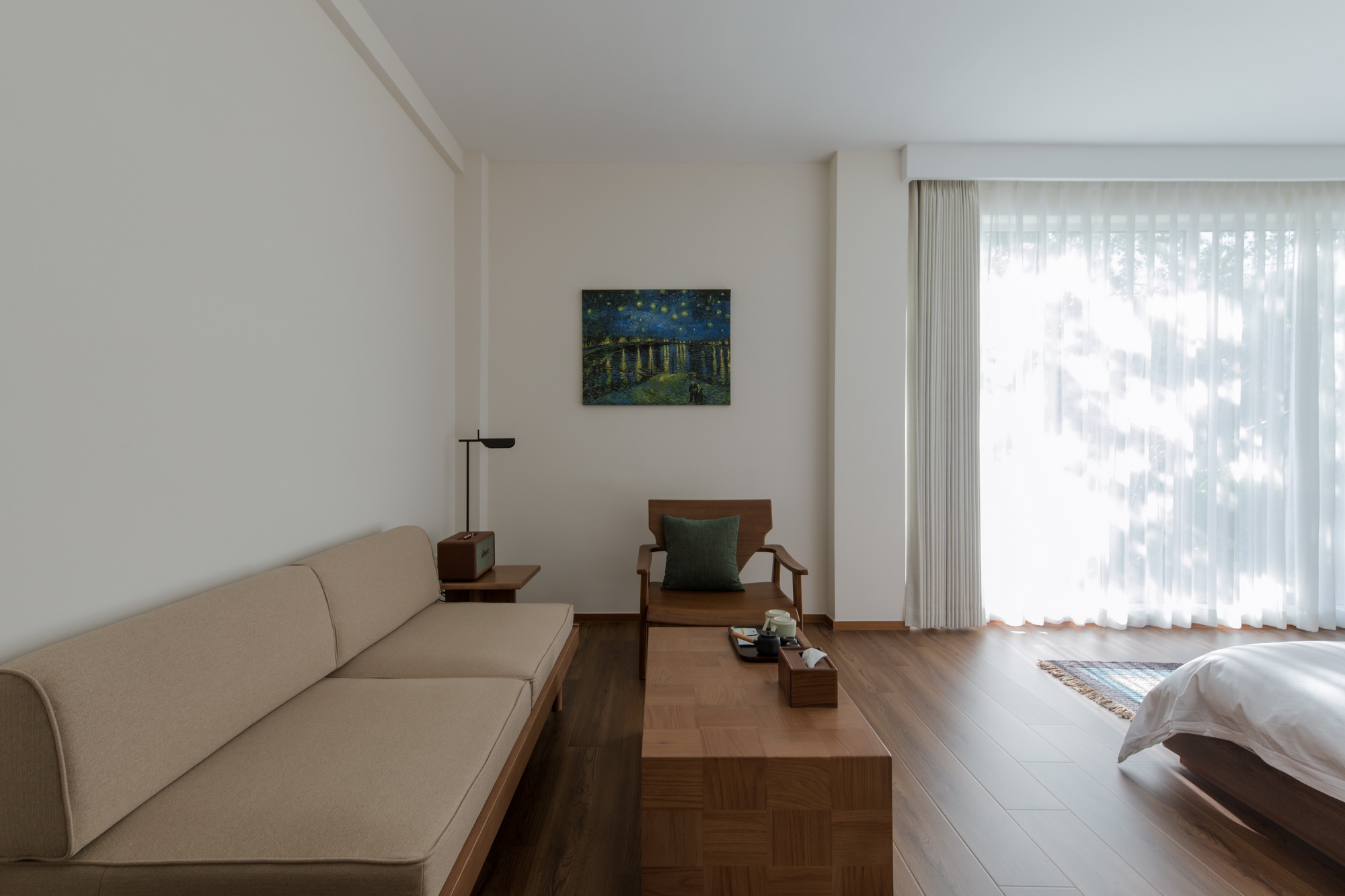
▲ 室内角窗 Interior corner window
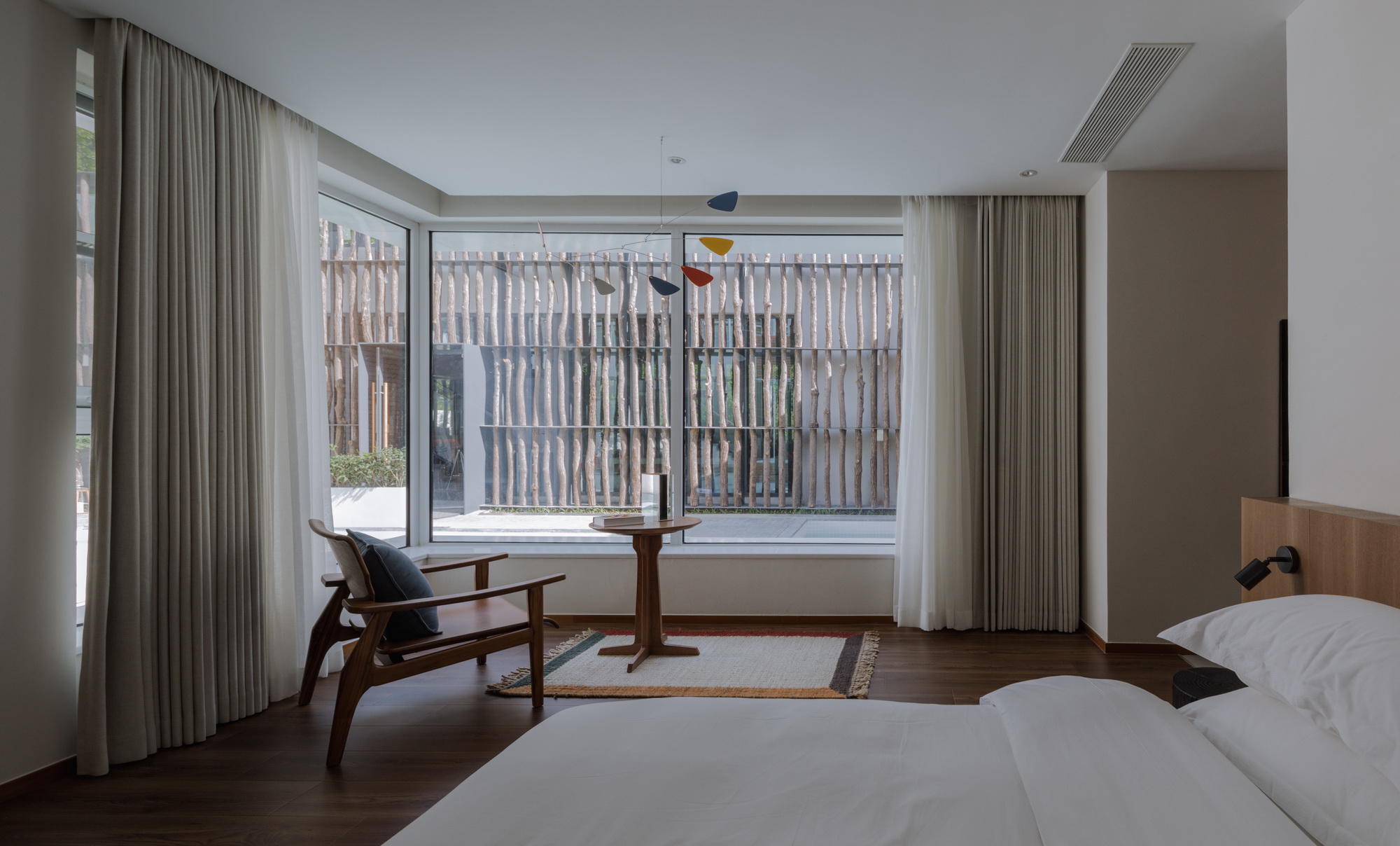
▲ 室内角窗 Interior corner window
艺术与居所 Art and Interior
从项目所在地的艺术写生文化背景和未来运营策略角度出发,我们置入了十一个艺术主题作为室内空间氛围营造的切入点。在色彩搭配与艺术装置的选用上使得室内与室外空间,以及建筑形制之间形成了一定的趣味性和主题性。
From the perspective of the art sketching cultural and future operation strategy of the project site, we placed eleven art themes as the starting point for creating special atmosphere of the indoor space. The choice of colors and art installations creates a certain interest and theme between the indoor and outdoor spaces, as well as the architectural form.
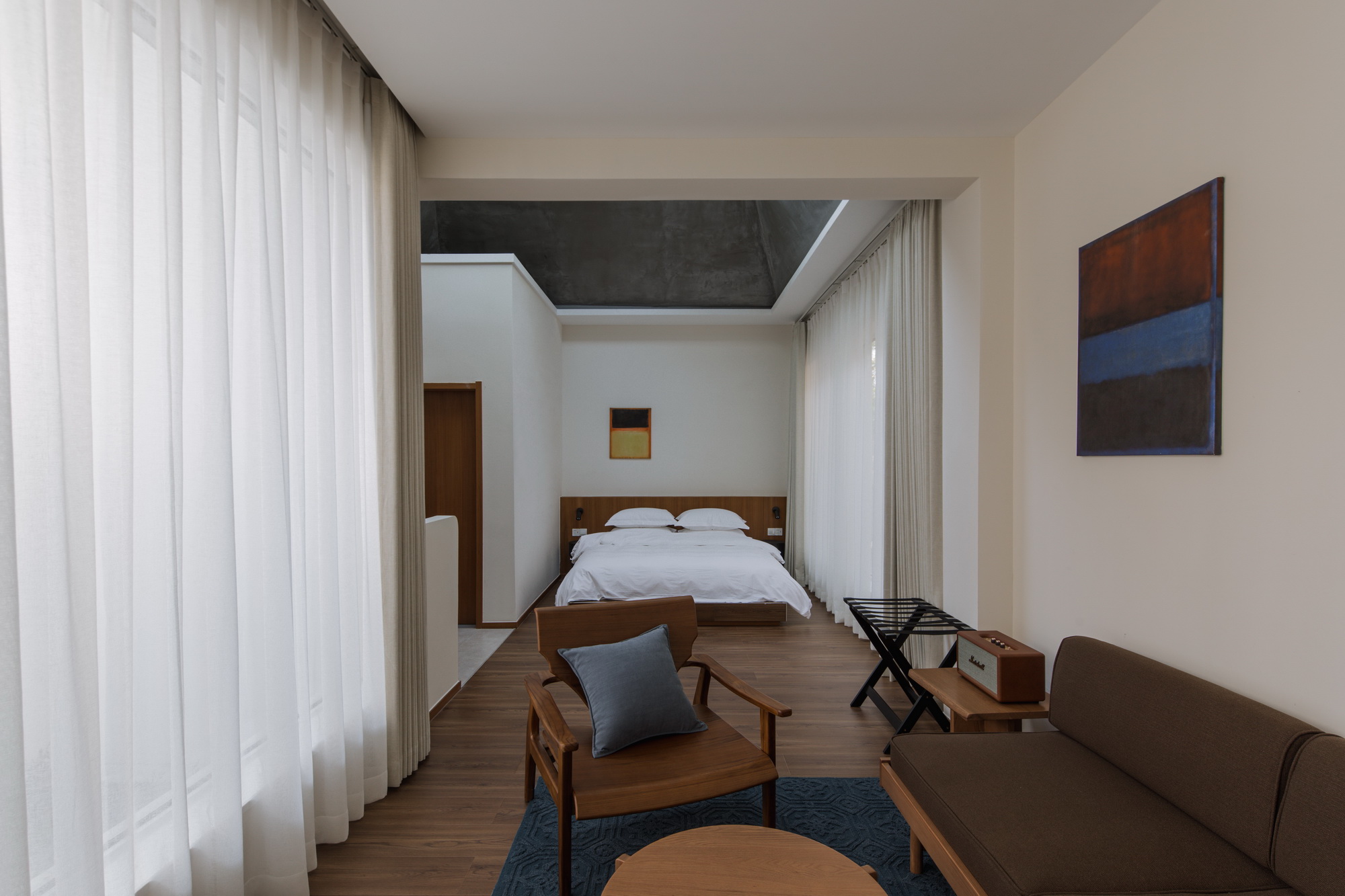
▲ 室内空间与艺术主题 Interior space and art theme
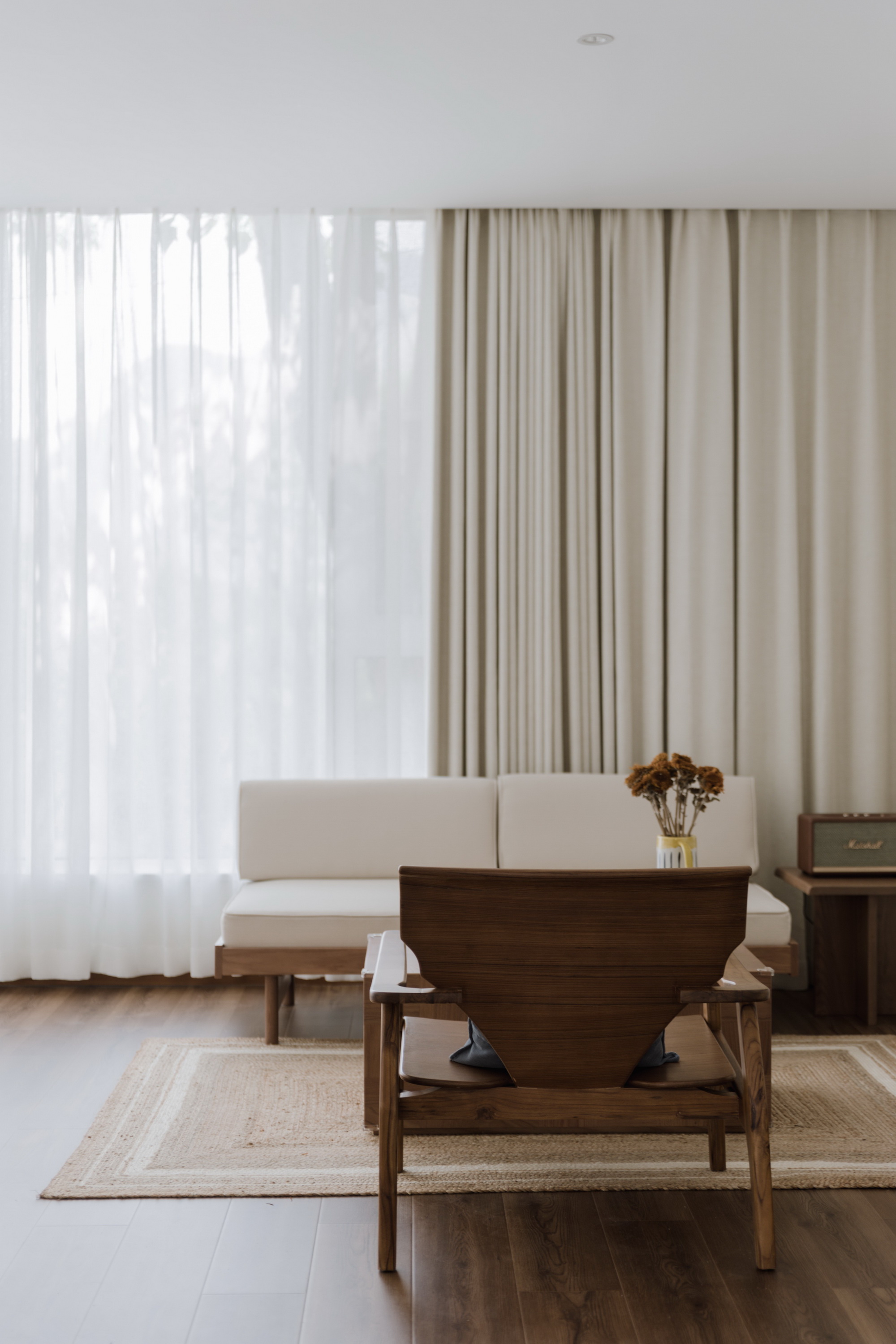
▲ 室内空间与艺术主题 Interior space and art theme
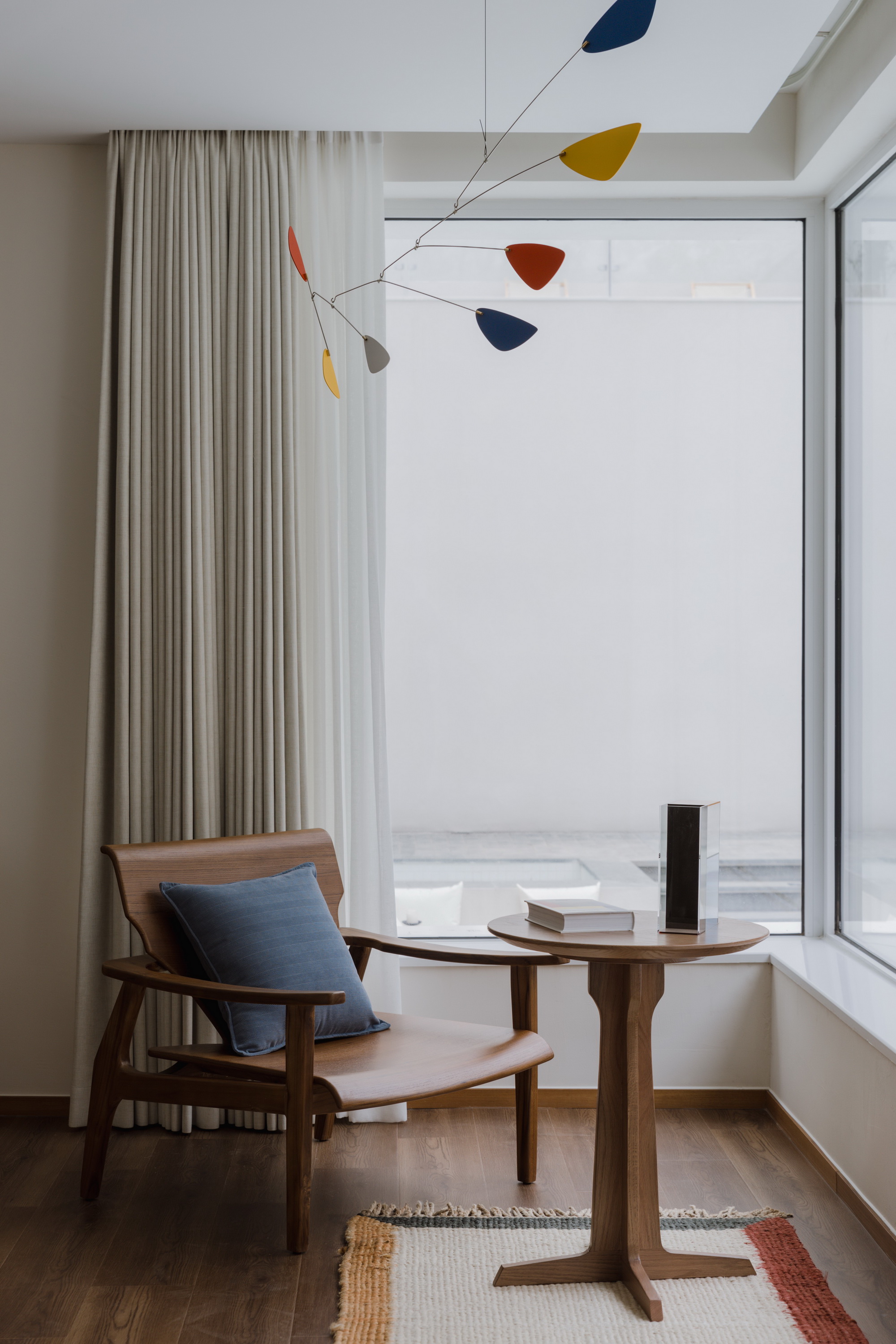
▲ 室内空间与艺术主题 Interior space and art theme
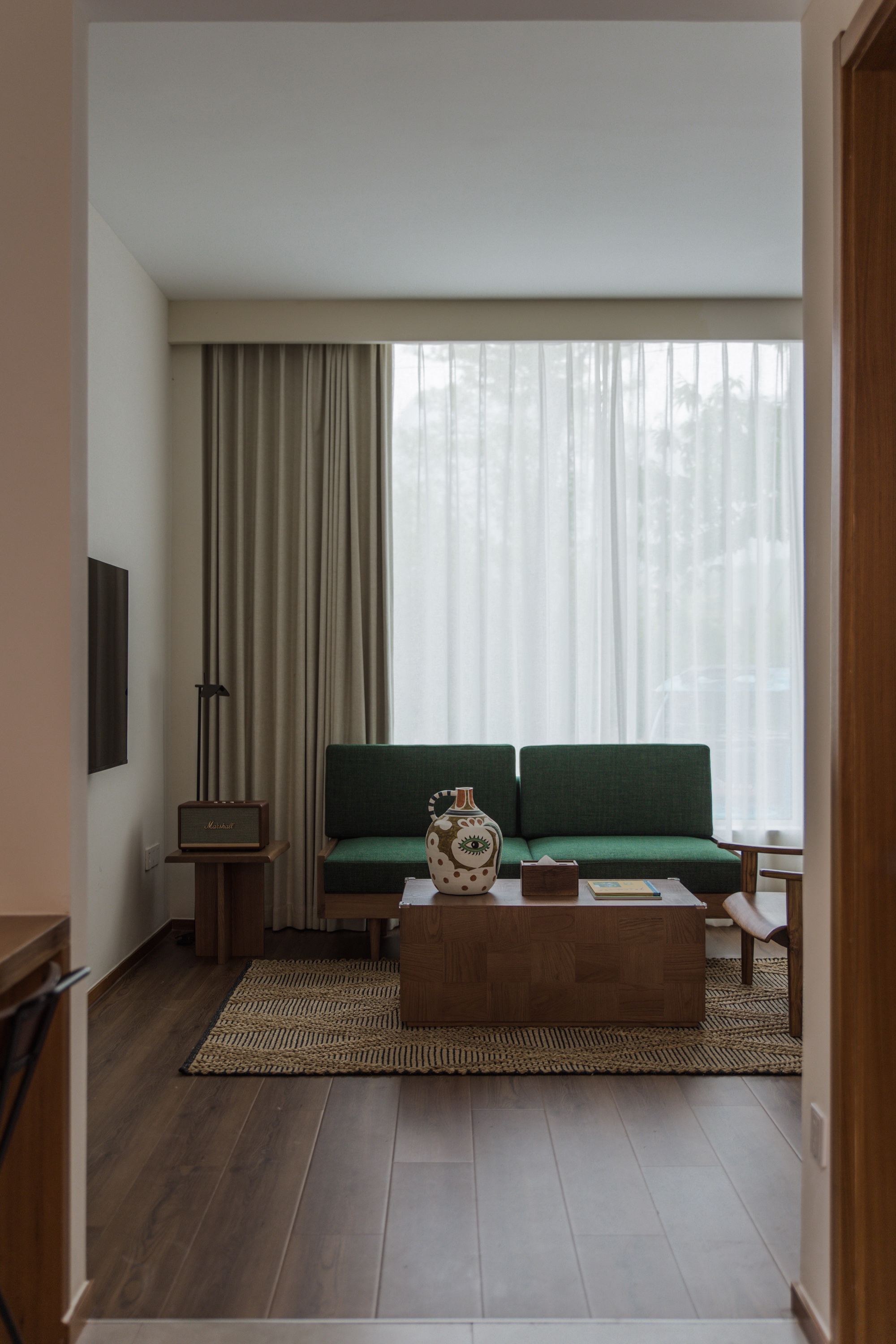
▲ 室内空间与艺术主题 Interior space and art theme
设计图纸 Design drawings
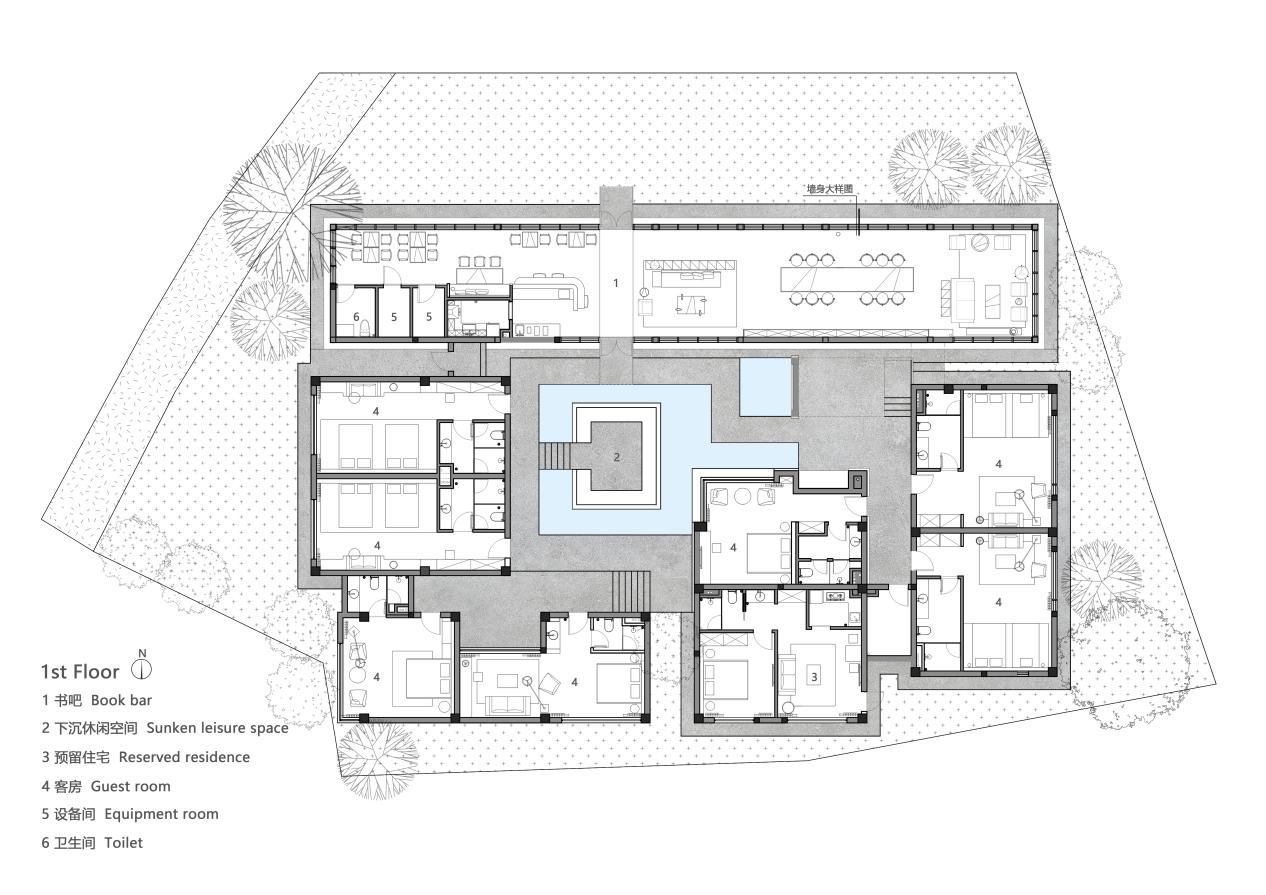
▲ 一层平面图 First floor plan
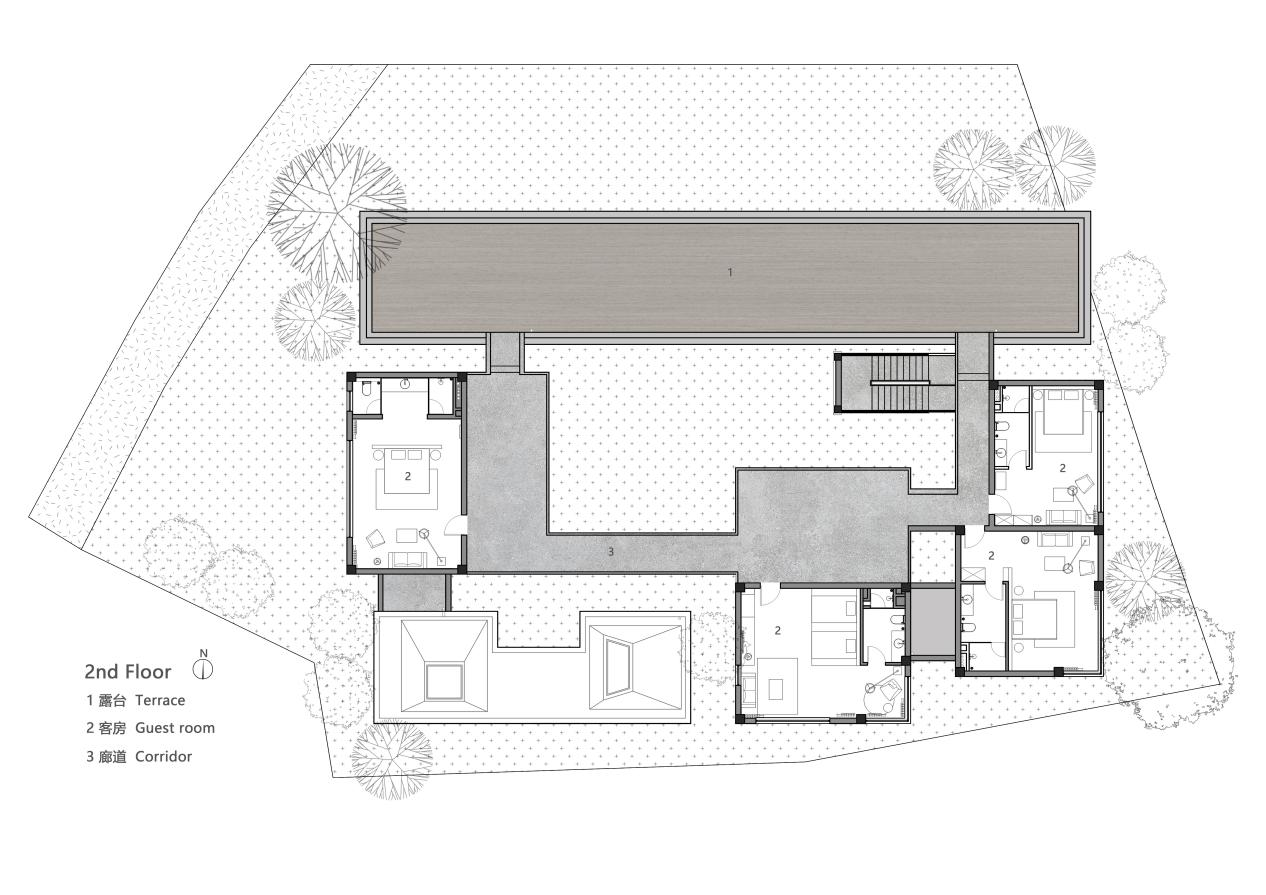
▲ 二层平面图 Second floor plan
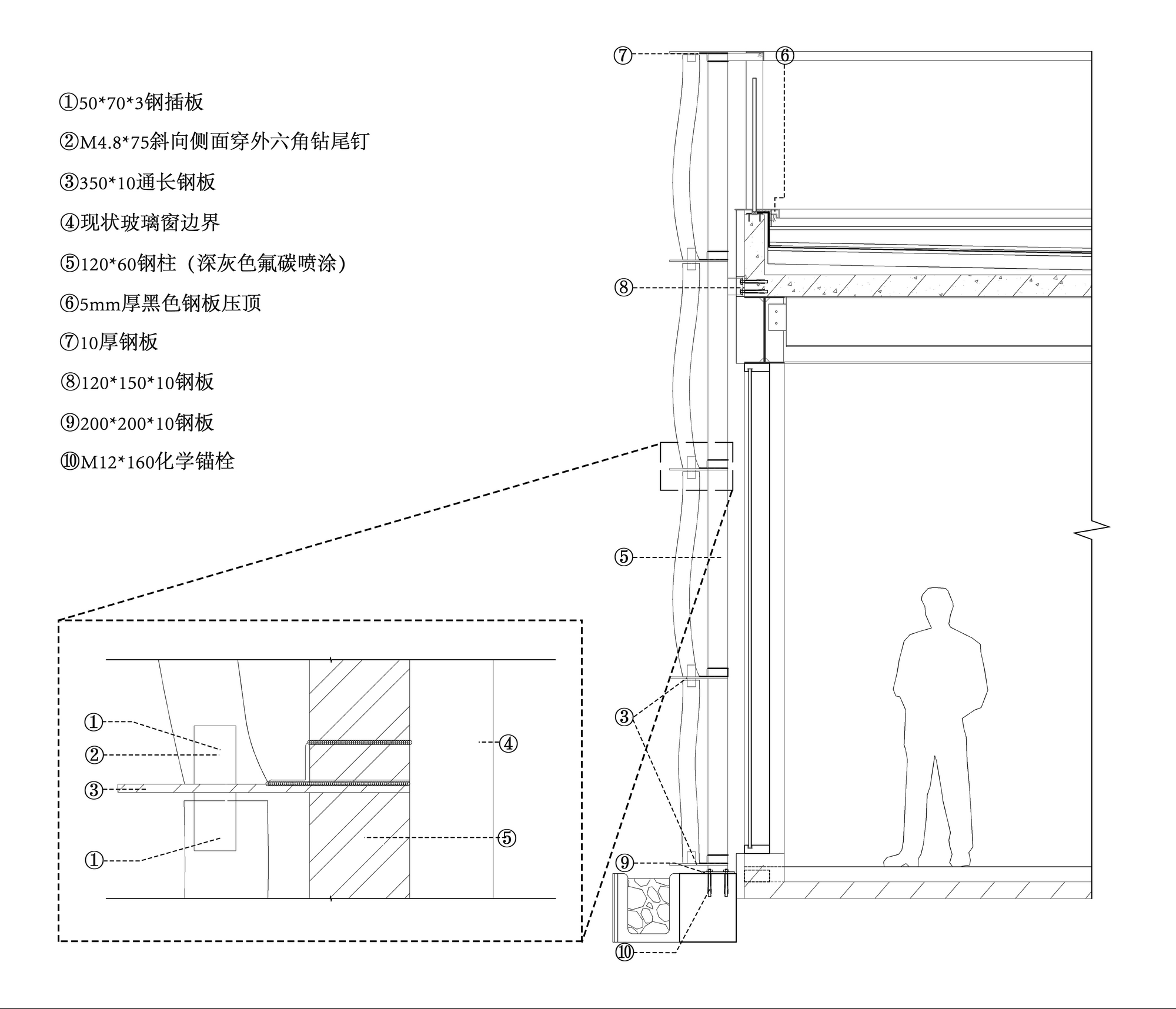
▲ 节点图 Detail
项目名称:山东沂蒙书舍民宿
Project Name: Shandong Yimeng Read & Rest Hotel
项目类型:建筑,景观,室内
Project Type: Architecture, Landscape, Interior
项目地点:山东,蒙山百花峪
Location: Mengshan Baihuayu, Shandong
设计单位:灰空间建筑事务所
Architects: Greyspace Architects
主持建筑师:苏鹏,刘漠烟
Principle Architects: SU Peng, LIU Moyan
设计团队:琚安琪,应世蛟,姚静洁,莫仙,李园园,李佳辰
Design Team: JU Anqi, YING Shijiao, YAO Jingjie, MO Xian, LI Yuanyuan, LI Jiachen
业主:山东沂蒙慢谷文化旅游发展有限公司
Client: Shandong Yimeng Mangu Cultural Tourism Development Co., Ltd.
建成状态:建成
Project Status: Construction completed
设计时间: 2019 年4 月- 2023 年 2月
Design Time: 04/2019 - 02/2023
建成时间:2023年4 月
Build Time: 04/2023
占地面积:1422㎡
Building Area: 1422㎡
建筑面积:751㎡
Total Floor Area: 751㎡
结构顾问:马海清
Construction Consultant: MA Haiqing
施工: 杭州归乡宅院科技有限公司
Constructor: Hangzhou Homecoming Homestead Technology Co., Ltd.
材料:刺槐,钢板,木
Material: Robinia pseudoacacia, Steel plate, Wood
摄影:陈旸
Photograph: CHEN Yang